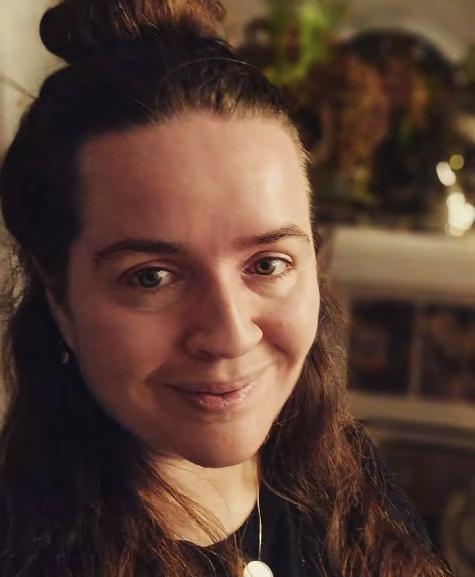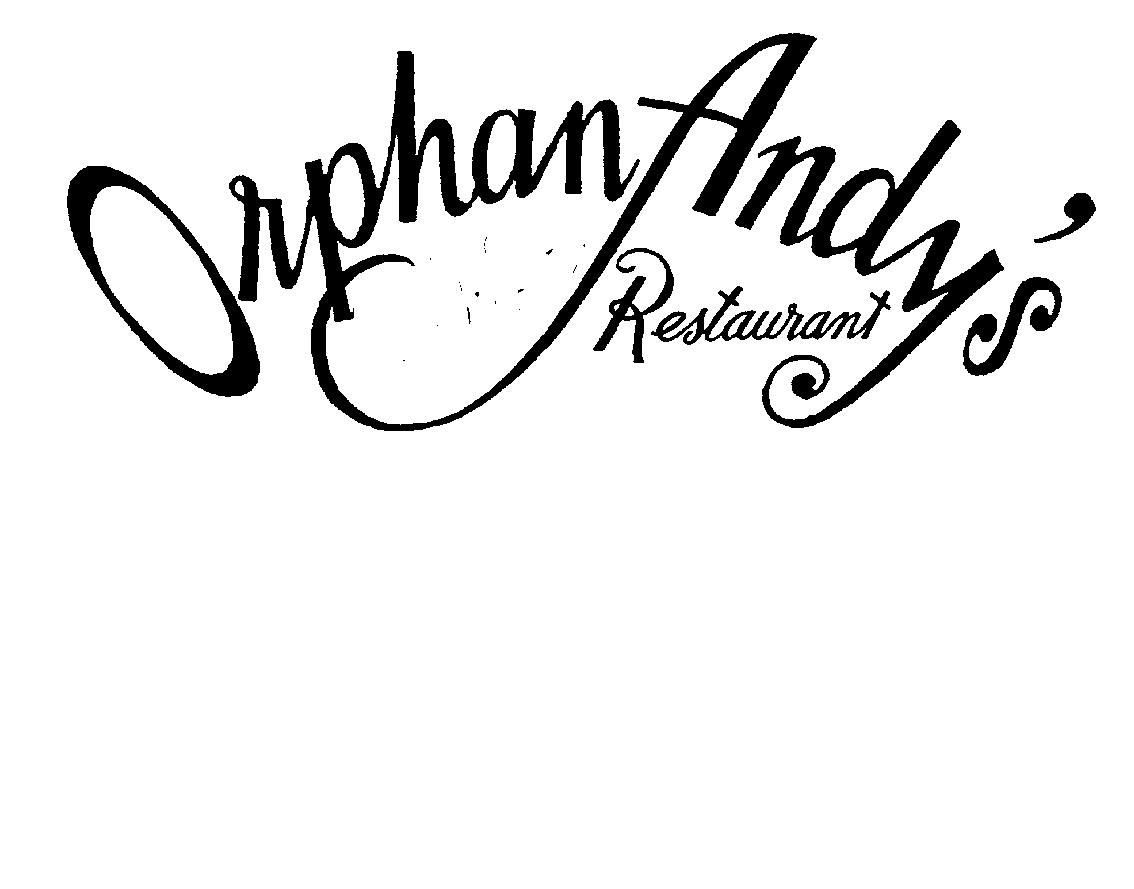










by Matthew S. Bajko
LGBTQ leaders were swift to denounce California Governor Gavin Newsom for his remarks on the debut episode of his new podcast during which he said it was “deeply unfair” to allow transgender athletes to participate in female college and youth sports.
The affinity group for out lawmakers in the state Legislature called Newsom’s comments sickening and anti-trans, while gay state Senator Scott Wiener (D-San Francisco) criticized the governor for having on the inaugural edition of his “This is Gavin Newsom” podcast as a guest Charlie Kirk, the conservative provocateur and founder of Turning Point USA who is a vocal supporter of Republican President Donald Trump and routinely attacks the transgender community.
During their discussion, which was released online March 6, Newsom told Kirk that he “agreed” with him when it comes to the issue of requiring trans athletes to play on sports teams based on the sex they were assigned at birth.
Kirk told Newsom that, “You, as the governor, should step out and say ‘no, no.’” To which Newsom replied, “Right… I think it’s an issue of fairness. I completely agree with you on that. It’s deeply unfair.”
Telling Kirk that he was “completely aligned” with him on the issue, Newsom blamed California’s policy requiring trans female student athletes to be allowed to play on women’s sports teams to a bill signed by his predecessor, former governor
by John Ferrannini
San Francisco Mayor Daniel Lurie is still very much enjoying a honeymoon with voters.
That was apparent with Castro denizens who greeted him on a sunny Friday afternoon merchant walk two months into his term.
Gay and AIDS activist Cleve Jones was among those who said hello to Lurie as he strolled the city’s LGBTQ neighborhood March 7. A longtime neighborhood fixture who now resides in Guerneville, Jones is a union activist with Unite Here, which represents hospitality workers.
Unite Here Local No. 2 and several hotel chains came to a labor agreement after a strike last fall, which Lurie had won praise for helping to resolve after winning last year’s mayoral race on the November ballot. Jones walked up to Lurie to offer appreciation for his role in ending the strike.
“I just want to thank you,” Jones, who had not met Lurie before, said. “What you did for the members of Local 2 meant the world for me. Apparently, you knew who to call.”
Lurie responded, “I knew we had to get going on that.”
See page 8 >>

Jerry Brown, more than a decade ago.
“It turns out in 2014, years before I was governor, there was a law established that established the legal principles that allow trans athletes in women’s sports. The issue of fairness is completely legit. I completely align with you, we have to acknowledge it,” said Newsom.

in Courage, sometimes not. We woke up profoundly sickened and frustrated by these remarks,” stated Ward and Menjivar. “All students deserve the academic and health benefits of sports activity, and until Donald Trump began obsessing about it, playing on a team consistent with one’s gender has not been a problem since the standard was passed in 2013.” Wiener, who chaired the San Francisco Democratic Party for two years during Newsom’s tenure as the city’s mayor, also criticized the governor for his remarks.
“The Governor has had many courageous moments over the decades supporting LGBTQ people, including helping turbo-charge the marriage equality movement, protecting LGBTQ kids against forced outing and criminalization, and protecting trans people from criminalization in other states. He has taken significant political hits for doing so. I and so many will be forever grateful for that courage,” noted Wiener. “This is not one of those moments. Charlie Kirk is a vile bigot, and standing with him on this issue is profoundly disturbing.”
On her popular newsletter and website Erin In The Morning, transgender journalist and advocate Erin Reed also called out Newsom for inviting Kirk onto his podcast.


California Legislative LGBTQ Caucus chair gay Assemblymember Chris Ward (D-San Diego), and vice chair lesbian state Senator Caroline Menjivar (D-San Fernando Valley) were quick to condemn Newsom’s “anti-transgender remarks” in a statement released Thursday morning.

“When Newsom platforms someone like Charlie Kirk, he isn’t fostering a ‘discussion’ on transgender people in sports – he is handing a known hate monger a microphone to denigrate an already vulnerable community,” wrote Reed. “That’s the real objective.



“Sometimes Gavin Newsom goes for the Profile


See page 8 >>
by John Ferrannini
The major HIV conference in San Francisco this week coincides with growing fears that budget cuts being pushed by Republicans will gut essential health care services in the United States and worldwide. Advocates have been growing more vocal that the funding reductions will result in potentially catastrophic consequences, as people in treatment for the virus that causes AIDS are cut off from their life-saving medications.
A Save Our Sciences rally March 10 at the Yerba Buena Gardens in the city’s South of Market neighborhood – adjacent to the Moscone Center, where the Conference on Retroviruses and Opportunistic Infections, or CROI, took place March 9 to 12 – attracted hundreds of attendees. One participant was Richard Jefferys, a gay man who is the basic science, vaccines and cure project director with the Treatment Action Group.



The Los Angeles Blade covers Los Angeles and California news, politics, opinion, arts and entertainment and features national and international coverage from the Blade’s award-winning reporting team. Be part of this exciting publication serving LGBT Los Angeles from the team behind the Washington Blade, the nation’s first LGBT newspaper. From the freeway to the Beltway we’ve got you covered.
In an interview with the Bay Area Reporter postprotest, Jefferys explained how people who can no longer access antiretroviral medications due to the abrupt cuts in the United States President’s Emergency Plan for AIDS Relief, or PEPFAR, are not only at risk themselves. Due to no longer being able to take their medicines to keep their HIV viral loads under control, they could also be incubating new and more dangerous forms of the virus, he warned.
“For someone with HIV, their load count would rebound and they’d be more susceptible to opportunistic infections,” Jeffreys said.



Several hundred researchers, scientists, clinicians, activists, people living
and their
no
And it’s not just PEPFAR. The United States Agency for International Development, or USAID, was “one of the main funders of tuberculosis prevention around the world,” noted Jefferys, adding that, “TB remains the largest killer of people with HIV globally. This administration has made the Ameri-
can people complicit in one of the worst acts of mass murder ever in our history. … Everyone alive today has benefited from scientific research.”
The U.S. Congress reauthorized PEPFAR last year through March 25, 2025; however, after President
See page 9 >>

by John Ferrannini
Five finalists who’ve been selected to be chancellor of City College of San Francisco, including two who are LGBTQ, have been touring the campus this week.
Mitchell Bailey, a gay man who is currently the interim chancellor, is one of them. He had told the Bay Area Reporter last May when he stepped in for David Martin that he wasn’t intending on seeking the permanent position, but has apparently changed his mind. While Bailey is the college’s first gay male leader, he’s not the first out interim chancellor; that distinction belongs to lesbian Susan Lamb, who was tapped for the position in 2015, as the B.A.R. previously reported.
Another person seeking the chancellorship is Carlos Cortez, Ph.D., the former chancellor of the San Diego Community College District. Cortez is the first chancellor in the state’s community college system to identify as queer and nonbinary, according to a writeup published by his alma mater, the University of Southern California.
Cortez, 50, told the B.A.R. March 10 that he’d seen the position available several times and decided to give it a shot. He’d spent some time as an undergraduate in the Bay Area in the 1990s.
“[UC] Berkeley undergrad helped awaken my own queer identity,” Cortez said. “My folks made me go back to the East Coast, because they were concerned I was changing too quickly.”
After finishing his master’s at Georgetown University, Cortez returned to the Golden State. He said he set his eyes on

City College because, “I appreciate the population the college serves, the mission of the institution and believe it has an important history that can’t be understated.”
Cortez said he’d be a good addition because he has helped facilitate communication between different stakeholders, such as the academic senate and faculty groups. He noted that historic relations between administration and the faculty union at City College needed some improvement.
Rounding out the finalists are Rudy Besikof, Ed.D., president of Laney College in Oakland; Kimberlee Messina, Ed.D., president of Spokane Falls Community College in Washington state; and Henry Yong, Ed.D., Ed.S., chancellor of the Yosemite Community College District.
Besikof oversaw the opening of the
first queer student center at Laney earlier last year, as the Peralta Community College District’s student publication
The Citizen reported. He has been serving as Laney’s president since 2020, and before his arrival there as vice president of instruction in 2018, was a chief instructional officer and a dean in different single and multi-college districts in the state. He was the winner of the 2024 Outstanding Community Partner Award from the Oakland Chinatown Chamber of Commerce.
Messina worked in the California Community College system for 26 years before she went to the Evergreen State. This includes a decade as a tenured faculty member at Santa Rosa Junior College, time as interim president of Foothill College (her permanent position was vice president of instruction and institutional research) and also two
years as vice chancellor for educational services and planning at the San Mateo County Community College District.
Yong’s district includes Modesto Junior College and Columbia College in Sonora. He was previously the president of Evergreen Valley College in San Jose for six years, and the vice president of instruction at Taft College in Kern County.
When asked to speak with any of the finalists, the B.A.R. was referred to City College’s human resources department, which did not return two emails by press time.
Forums being held all week with the finalists that have been open to the public, both in person and via Zoom, “will allow the finalists to introduce themselves, share their vision and priorities, and respond to questions gathered from the campus community,” according to a news release from the community college.
Students, faculty, classified professionals, and administrators have helped to facilitate them.
According to the special webpage at https://www.ccsf.edu/ccsf-chancellorsearch that City College officials created for the chancellor’s search, the forums are being held daily through Friday, March 14. There are different times throughout the day for various campus stakeholders, with those for the public set to begin each day at 5:15 p.m.
They are taking place in person in Room 101 of the recently opened Steam Building at the college’s main Ocean Campus at 50 Frida Kahlo Way. The forums will also be accessible online via the Zoom at https://ccsf-edu.zoom.us/ webinar/register/WN_aO1wgY1rQ0yAAAWTAjLQ-w.
The finalists will be voted on by the San Francisco Community College District Board of Trustees in mid-April, with the expectation the person selected will start July 1. On behalf of the board, trustee Alan Wong stated to the B.A.R. March 7 that the “trustees agreed not to have any comment at this time.”
The district has a budget of $300 million, and City College is its sole constituent community college. The San Francisco Chronicle reported last year that layoffs and budget cuts in an attempt to achieve fiscal stability made former chancellor Martin unpopular with parts of the faculty union.
While the board was able to approve a balanced budget and set aside a 5% reserve, it faced harsh criticism from students and faculty over the cuts it made to do so. And it is already bracing for more fiscal challenges as it works on its next budget and in coming years.
In adopting its budget last year, the college district warned it could be facing a $171,494 in the fiscal year that begins July 1. And it projected the deficit could balloon to nearly $8.5 million in fiscal year 2027-2028.
One thing Cortez said he’d like to focus on if selected as the next chancellor is boosting City College’s noncredit, also called continuing education, program. He said San Francisco had been the leader in that field till he beefed up the San Diego program.
“This is the core of DEI work if you’re interested in social justice through education,” he said, referring to diversity, equity and inclusion. “You’re working with the must vulnerable members of our community.” t
by John Ferrannini
Rumblings from community mem-
bers hint that Another Planet Entertainment may be behind the move to evict a coffee shop and nail salon that rent space in a building owned by the family that owns the Castro Theatre, of which they are a part. The long-standing businesses are in ongoing negotiations with the owners of the theater to stay in their spaces past June.
Castro Coffee Company, at 427 Castro Street, and Castro Nail Salon, at 431 Castro Street, flank the theater, which is currently closed due to ongoing renovations. The theater has been owned by the Nasser family for generations but, since 2022, it has been managed by Bay Area concert promoter Another Planet Entertainment, which is spearheading a massive renovation and restoration project.
Now, as the renovations are ongoing, the two storefront businesses may have to leave by June, the Bay Area Reporter has learned. The coffee company’s owner, Ken Khoury, declined to comment for this report, citing the ongoing negotiations over his lease.
Khoury explained a little more about his situation at the Castro Merchants Association’s meeting March 6.
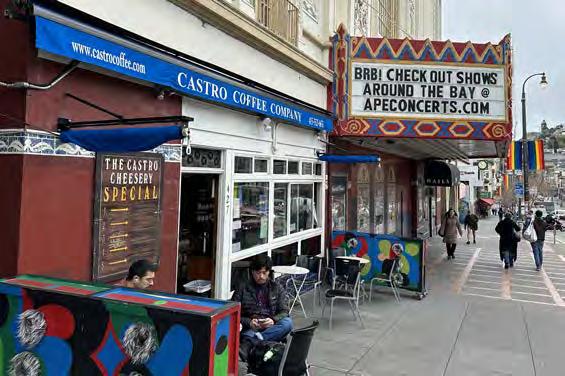
“Typically, the landlord would renew my lease for three years,” he said, adding his shop was “very vital” to the Castro community.
“My roots are really deep in the neighborhood and I’m not about to give it up,” he added. “We need support from the neighborhood — not yet, we’re negotiating, I don’t have anything definitive to tell you at this point — but I want to make everyone aware of what’s happening.”

He has owned the business since 1987, according to his LinkedIn profile. It previously had been known as the Castro Cheesery and has been a staple in the neighborhood for close to 40 years.
Nail salon owner Riyad Khoury told the B.A.R. March 5, “We are negotiating to figure out the situation and we hope they can give us something we can accept, that we can live with.”
According to 2021 data published by the San Francisco Chronicle, the parcel containing the coffee company, the nail salon, and the theater is owned by Bay Properties Inc. and Steven R. Nasser. The three-unit property was assessed at a value of $4.9 million.
The Nasser family could not be reached by press time.
APE stated it has “nothing to do” with the leases of the respective businesses.
“Another Planet Entertainment is not the owner of the Castro Theatre,” APE spokesperson David Perry, a gay man, stated. “The two businesses in question are not our tenants or subtenants, and we have nothing to do with their leases.”
Perry disavowed what he phrased as a “rumor” that APE wanted to acquire the spaces.
“We’re not going to comment on a hypothetical,” he stated. “At the moment we’re focused on getting the theater open for the community.”
As the B.A.R. reported last month, APE had initially announced a summer 2025 date for the opening of the theater but pushed it back due to ongoing electric connectivity issues with which APE has a disagreement with the Pacific Gas & Electric Co.
APE’s changes to the interior of the building had elicited opposition from community members, who contended the plans amounted to a wreck-o-vation. Groups like the Castro Theatre Conservancy and the Castro LGBTQ Cultural District lobbied to landmark the fixed, orchestra-style seating inside the theater in an attempt to prevent APE from replacing them with seating that can be retracted so that the venue could be used for concerts as well as for cinema.
These efforts failed, and the theater’s interior was landmarked by the San Francisco Board of Supervisors, though not the seating.
Board of Supervisors President Rafael Mandelman, a gay man who as District 8 supervisor represents the Castro neighborhood on the board, stated to the B.A.R., “From my perspective it’s pretty unfortunate.”
“These are beloved businesses and active street-facing uses that help activate that block every day,” Mandelman stated. “We have reached out to the Office of Economic and Workforce Development to try to find alternative storefronts if the businesses are interested.”
A spokesperson for the city’s Office of Small Business, which is hosted by OEWD, stated to the B.A.R., “Our team has been in touch with both the coffee shop and nail salon.”
Asked how the search is going, a spokesperson for the city’s Office of Small Business stated to the B.A.R. that the office “has offered our services to both the Castro Coffee Company and Castro Nail Salon. This includes help in lease negotiations. We can also support with relocation help from our leasing advisers, as well as permitting, if they end up relocating. We defer to the businesses themselves for an update on how it’s going for them.”
Nate Bourg, a gay man who is treasurer of the Castro Merchants Asso-
ciation and in line to be its next president, issued a statement on behalf of the group to the B.A.R.
“Negotiations between landlords and tenants are a private matter, however, these businesses are important fixtures on the upper end of the 400 block of Castro Street that help drive footsteps in the daytime and keep the block thriving and vibrant,” he stated. “We hope that some resolution can be found to ensure the continued vibrancy.”
Tina Aguirre, a genderqueer Latinx person who is the director of the cultural district, stated to the B.A.R. March 5, “I’ve been getting my coffee beans from the Castro Coffee for decades and I love the nail salon.”
“I would be very sad if they have to move because the owners of the Castro Theatre have displaced them,” Aguirre continued. “While the businesses could thrive in other spaces, the question remains that if the Nassers decide to annex the spaces for usage by the theater, what will bring people into the neighborhood when the theater is primarily (and sporadically) used in the evenings and if self-contained in terms of selling food, alcohol, and sodas? It will not serve as a draw for other neighborhood restaurants and cafes. I want the Castro Theatre to thrive and this does not have to be at the expense of longtime businesses like Castro Coffee and Castro Nail Salon. I urge the Nassers to reconsider their plans to annex these spaces.”
Gerard Koskovich, a queer public historian who is a founding member of the GLBT Historical Society, was outspoken in his opposition to APE’s theater plans. He stated there may be precedent for APE taking over the storefronts.
“There was speculation about this during the Save the Castro campaign based on APE’s repurposing of the Fox Theatre in Oakland, which likewise swallowed up the street-level storefronts,” Koskovich stated, though he had not heard of the negotiations between the coffee company,
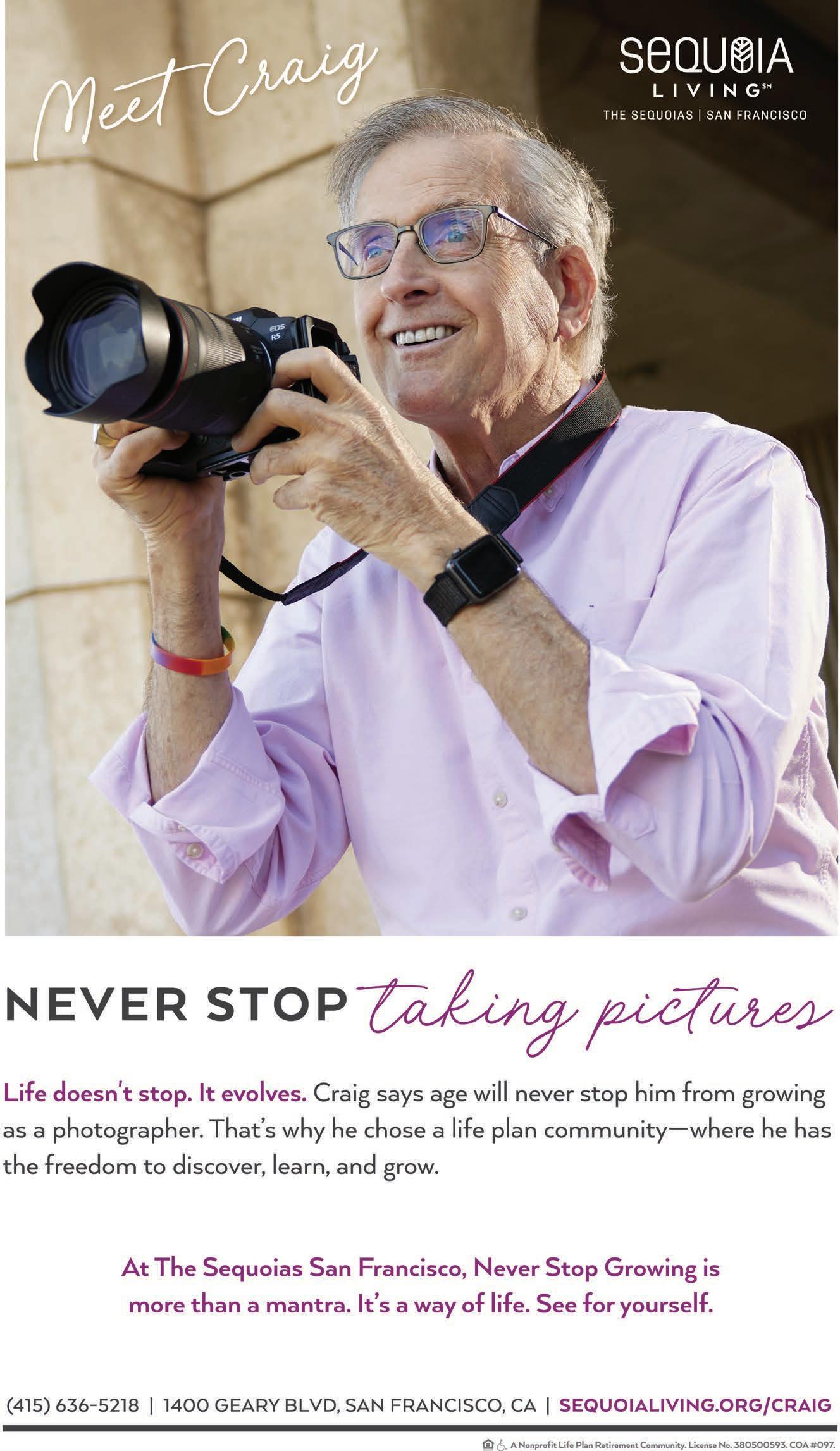
by Matthew S. Bajko
Roger Brigham, the Bay Area Reporter’s former sports columnist who was unsparing in his coverage of the controversies surrounding global LGBTQ sporting events and shone a spotlight on local out athletes with his coverage, died March 5 after a long battle with renal and cardiac issues. The gay Oakland resident was 71.
Mr. Brigham, who wrote about his living with HIV, retired his “Jock Talk” weekly column in 2022, 15 years after he had taken over the paper’s athletic news coverage. His approach to it was a mix of straightforward news reporting and noholds-barred commentary when such writing was required.
He had particularly acerbic takes when it came to his coverage about oversight of the Gay Games and the ill-fated World Outgames launched to compete with the better-known event started in San Francisco. Mr. Brigham notoriously labeled the rival group “a nihilistic golem haunting LGBT participatory sports since 2004” upon its demise 13 years later.
As he wrote in his final column for the B.A.R., “I hope you have come to see me for the cheeky and combative columnist I have striven to be.”
B.A.R. news editor Cynthia Laird called Mr. Brigham “the quintessential

sports columnist.” She had hired him to take over the paper’s column, with his first debuting in January 2007.
“His coverage of the ups and downs around the Gay Games was required reading for LGBTQ sports fans, even as he was involved with the organization over the years, which he disclosed,” stated Laird. “He brought a real news sense
to his writing, as he was an experienced sports reporter during his career. I will miss the conversations and emails we shared over queer sports issues.”
A lifelong wrestler and one-time rugby player, Mr. Brigham was elected as the Federation of Gay Games’ officer of communications in 2004. He said that he was reelected in absentia in 2005
against his wishes and resigned within a couple of months. In 2023, he received the FGG’s Dr. Tom Waddell Award, named after its founder.
In a post on its X account, the Gay Games paid tribute to Mr. Brigham.
“Roger Brigham is remembered by the LGBTQ+ sports and culture community for his service as a professional journalist and directly for the FGG, where he created communications initiatives, served on the Strategic Planning Committee, and developed the FGG’s anti-doping policy,” stated the post.
Mr. Brigham died just days prior to the 34th anniversary of first meeting his husband, Eduardo Guardarramas, which they had planned to mark on March 9. The men had first married in 2004 when San Francisco officials began marrying same-sex couples, but due to that wedding being annulled by the courts, they exchanged vows a second time in 2013.
“He was a very smart man; he was a very, very giving man,” Guardarramas said. “He was a mentor to many journalists or to many sports writers.”
Guardarramas had alerted Mr. Brigham’s friends that he was close to dying in a March 3 post on his Facebook account. Guardarramas told the B.A.R. that Mr. Brigham had been in the hospital awaiting surgery after a septic bacterial infection of his artificial hip

led his doctors to want to remove it but were waiting to proceed due to concerns about his kidneys and heart.
But when it became clear his organs would not be up for the procedure, Mr. Brigham asked to be taken home, as he did not want to die in the hospital, said Guardarramas. Back at their Oakland home on February 27, he was surrounded by the couple’s seven cats all with Macedonian and Greek names stemming from Mr. Brigham’s having a double major in ancient civilizations and journalism, and their two Bernese Mountain dogs.
“He is a 40-year AIDS survivor. It wasn’t the AIDS that killed him, it was all the freaking medication after a while,” said Guardarramas. “He had two artificial hips, a kidney transplant, stents in the heart, and you put it all together ... we had remarked over the years that he died on me many, many times. This is the final time. We used to call him nine lives.”
Over the past week, family, friends and former wrestling teammates and wrestlers he coached came to say their goodbyes. Friends began posting tributes to Mr. Brigham on his Facebook account March 5 upon learning the news of his passing.
“Roger never wanted the story to be about himself, so he would find everyone remembering him with love to be a tad embarrassing,” stated Outsports cofounder Jim Buzinski in the news site’s March 6 obituary for Mr. Brigham.
Buzinski and Mr. Brigham were early trailblazers as out gay sports editors, over which they bonded, noted the outlet.
“I have fond memories of watching Roger wrestle at several Gay Games and then come off the mat all sweaty and launch into a discourse with me about sports, politics, journalism and life. I will miss him,” stated Buzinski.
The end of his B.A.R. column also marked Mr. Brigham’s retirement from a 46-year professional journalism career and 41 years in sports writing and editing. He started work in 1976 as a news reporter with the Times Record in Troy, New York, and at the age of 23, became the editor of the Daily Mirror in Kodiak, Alaska.
In 1982, he became the first openly gay sports editor at a metropolitan daily newspaper, the Anchorage Daily Mirror, a biography on Muck Rack noted.
See page 5 >>
John T. Fostel
December 1, 1955 - February 10, 2025

John T. Fostel passed away on February 10, 2025, in Daly City at the age of 69 after braving a difficult year of health challenges. Born on December 1, 1955, John was a beloved brother, friend, and mentor whose kindness and dedication impacted countless lives.
He is survived by his siblings Mary and Eddie Hill and family, Eileen Fostel and family, Elizabeth Horan and family, Jean and Michael Vasquez and family, and countless sponsees. He was preceded in death by his parents, George L. and Ann M. Fostel, his siblings Catherine Fostel and George Fostel, and his beloved partner, Fernando.
John was deeply committed to the 12-step recovery community, sponsoring many over the decades, with his sponsor Keith F. and sponsee Gary M. by his side before his passing. He also dedicated his career to supporting those with substance use disorders, retiring as chief clinical officer of Baker Places in 2024.
by funding provided by the State of California, administered by the California State Library in partnership with the California Department of Social Services and the California Commission on Asian and Pacific Islander American Affairs as part of the Stop the Hate program. To report a hate incident or hate crime and get support, go to https://www.cavshate.org/.
A celebration of life will be held from 2 to 4 p.m. on March 22 at Most Holy Redeemer’s Ellard Hall, 100 Diamond Street in San Francisco.
Donations may be made to the Castro Country Club at castrocountryclub.org.
compiled by Matthew S. Bajko
Events around the Bay Area will mark this year’s observance of International Transgender Day of Visibility, annually held March 31. It was established in 2009 as a way to celebrate trans individuals and their contributions to society, as well as to shine a light on the discrimination they face.
This year’s celebration comes amid an ongoing attack on the rights of all gender-nonconforming individuals, whether they be trans, intersex or genderqueer. Republican President Donald Trump has prioritized attacking what he calls “extremist gender ideology,” while even LGBTQ-supportive Democrats have, of late, blamed trans issues for losing them the 2024 presidential election.
Last week, California Governor Gavin Newsom was roundly criticized by LGBTQ advocates for declaring in the inaugural episode of his new podcast that he doesn’t support trans female athletes playing on women’s teams. (See story Page 1.) It is in stark contrast to the state’s Senate, which is expected to adopt a resolution proclaiming March 31, 2025, as Transgender Day of Visibility and designating the week of March 24 through March 28, 2025, as Transgender Week of Visibility in the state’s Capitol.
“In California, we believe it is ever more critical to uplift and support our 2STGI residents and reaffirm their right to live visibly, openly, authentically, and unapologetically, without exception,” states the resolution, authored by gay state Senator Scott Wiener (D-San Francisco).
South San Francisco officials are hosting an event Saturday, March 29, to mark the annual observance with a screening of the movie “Barbie,” snacks, and activities such as making personalized pronoun pins and paracord bracelets. There will also be a clinic to provide assistance to those who want to update their gender marker and name on government IDs.
The event takes place from 1 to 5 p.m., with the film screening starting at 2 p.m., in the second-floor community
His later daily newspaper stops included being a sports feature writer and columnist for the Los Angeles Herald Examiner; executive sports editor for the Albany (NY) Times Union; and deputy sports editor for the Oakland Tribune. He handled sports coverage for two early internet media startups, eWorld and @Home.
Mr. Brigham was inducted into the National LGBT Sports Hall of Fame in 2015.

the Trump administration’s anti-trans policy agenda.
room of the city’s library and parks and recreation center, located at 901 Civic Campus Way. For more information, visit www.ssf.net/Events/InternationalTransgender-Day-of-Visibility-0325.
The San Mateo County Pride Center for a second time is offering a week’s worth of events to mark the observance. It will kick off March 26 with an online name change workshop and conclude with an in-person “Trans Day of Visibility Be-YOU-tiful Celebration” at the facility located at 1021 S. El Camino Real in San Mateo.
For the full lineup of events and information on how to RSVP for them, visit https://sanmateopride.org/transweek-of-visibility-week-2025/.
The Billy DeFrank LGBTQ+ Community Center in San Jose will mark the annual trans day event from 1 to 4 p.m. Saturday, March 29. Scheduled to speak are Congressmember Zoe Lofgren (D-San Jose) and San Jose Vice Mayor Pam Foley, who represents District 9 on the city council.
The South Bay center is located at 938 The Alameda in downtown San Jose. For more information, visit its website at www.defrankcenter.org.
As a former rugby player, Mr. Brigham bonded with the SF Fog rugby team in the months after 9/11. Mark Bingham, a gay man who was a leader and player on the SF Fog, had been killed on United Flight 93, which crashed into a Pennsylvania field. It’s widely believed that Bingham and other passengers were able to prevent the airplane from reaching its intended target, thought to be a government building in the Washington, D.C. area.
“I was very down after 9/11,” Mr. Brigham recalled in an interview with the B.A.R. in 2023.
LGBTQ publications host mental health talk
News is Out, the LGBTQ publication collaborative of which the Bay Area Reporter is a member, is hosting a free virtual discussion about LGBTQ+ mental health matters. The online event will include expert insights, a guided meditation, and a chance for attendees to ask questions of the panelists.
Among the speakers sched uled to take part are queer Asian-American psychotherapist Noel B. Ramirez, Ph.D., who is the director of Mango Tree Counseling in Phila delphia; and licensed pro fessional counselor Christy Hanson, Ph.D., founder of LGBTQ-affirming Hanson Counseling in Mabank, Texas.
is hosting a new discussion series titled “Constitutional Conversations” to discuss several amendments to the country’s governing document. Moderating the town halls are Director of Cultural Affairs Ralph Remington and Paul Henderson, a gay man who is executive director of the San Francisco Department of Police Accountability.

It will begin at 3 p.m. Pacific next Tuesday, March 18. To register, visit https:// forms.gle/9nXVY1B8x7VKtwBf6.
San Francisco leaders hold constitutional talks
The San Francisco Arts Commission
After meeting a Fog player at Oakland Pride, Mr. Brigham packed up his husband and dog and drove out to the team’s practice in San Francisco. He said he spent the day berating a reporter for not telling Bingham’s story earlier. He said Bingham represented the best of gay athletes and disproved those who believed LGBTQs could not play sports.
Mr. Brigham said that he got involved with gay sports not because he was gay, but because he was disabled, having had hip replacement surgery.
The second installment on March 18 will focus on the U.S. Constitution’s Amendments 13, 14, and 15, known as the Reconstruction Amendments, and what their impacts are on immigration and liberation matters. Among the panelists scheduled to take part is Jorge Rivas Jr., a gay man who is executive director of the city’s Office of Civic Engagement and Immigrant Affairs.
The event will take place in the second-floor Green Room inside the city’s War Memorial Veterans Building, located at 401 Van Ness Avenue. From 5 to 5:30 p.m. there will be artistic performances and activations showcasing musicians and performance artists re-
“After I had hip surgery I couldn’t run anymore,” he said, and he perused the Team SF website and joined the Golden Gate Wrestling Club in 2003 at the age of 50 with artificial hips. “I knew it’d be painful, but I went back to wrestling.”
It, in turn, led Mr. Brigham to become involved with Team San Francisco and the Federation of Gay Games.
“I was so grateful for the opportunities they afforded me that I devoted a great block of my time to volunteer-
sponding to the discussion topic. The town hall conversation will run from 5:30 to 7:30 p.m.
To RSVP and register for free to attend the gatherings in-person, or to watch a live stream of the town hall session online, visit sfartscommission.org/ constitutionalconversations.
Bay Area LGBTQs invited to online town halls
Horizons Foundation is presenting virtual regional town halls around the Bay Area in the coming weeks to discuss various LGBTQ issues in those communities and to connect residents with local LGBTQ-serving nonprofits in their area.
“Though our LGBTQ community now finds itself at a crossroads, with mounting threats emerging from multiple fronts, the reality is we have always faced adversity,” noted the nonprofit LGBTQ philanthropic organization. “And yet, together, we have overcome formidable challenges and unrelenting foes. Through unity, standing up for our rights, and celebrating our lives - out and proud - we have made, and will continue to make, meaningful progress for our LGBTQ community and its liberation.”
Each regional town hall will take place from 5 to 6 p.m. on a Wednesday night, though organizers said they could run to 6:30 p.m. depending on the discussions. The series kicked off Wednesday, March 12, with one in the North Bay focused on residents of Marin, Napa, Solano, and Sonoma counties.
One for the East Bay’s Alameda and Contra Costa counties is scheduled for March 19. A South Bay / Peninsula Regional Town Hall for residents of San Mateo and Santa Clara counties is to be held April 9, while the series will culminate April 16 with one for San Francisco County. More information on each town hall and how to register can be found at https://www.horizonsfoundation. org/regional-town-halls/. t
ing for both of those organizations,” as he wrote in his last “Jock Talk” sports column. “Connections from that involvement led to my signing on to write about sports for the B.A.R. It was, essentially, one more way for me to give back to my supportive community.”
Mr. Brigham was born October 14, 1953, and grew up in Columbus, Ohio. Per his wishes, Mr. Brigham will be cremated. A celebration of his life is being planned. t


Volume 55, Number 11
March 13-19, 2025 www.ebar.com
PUBLISHER
Michael M. Yamashita
Thomas E. Horn, Publisher Emeritus (2013)
Publisher (2003 – 2013)
Bob Ross, Founder (1971 – 2003)
NEWS EDITOR
Cynthia Laird
ARTS & NIGHTLIFE EDITOR
Jim Provenzano
ASSISTANT EDITORS
Matthew S. Bajko • John Ferrannini
CONTRIBUTING WRITERS
Christopher J. Beale • Robert Brokl
Brian Bromberger • Victoria A. Brownworth
Philip Campbell • Heather Cassell
Michael Flanagan •Jim Gladstone
Liz Highleyman • Brandon Judell • Lisa Keen
Philip Mayard • Laura Moreno
David-Elijah Nahmod • Mark William Norby
J.L. Odom • Paul Parish Tim Pfaff
Jim Piechota • Adam Sandel
Jason Serinus • Gregg Shapiro
Gwendolyn Smith • Charlie Wagner
Ed Walsh • Cornelius Washington • Sura Wood
ART DIRECTION
Max Leger
PRODUCTION/DESIGN
Ernesto Sopprani
PHOTOGRAPHERS
Jane Philomen Cleland
Rick Gerharter • Gooch
Jose A. Guzman-Colon • Rudy K. Lawidjaja
Georg Lester • Rich Stadtmiller
Christopher Robledo • Fred Rowe
Shot in the City • Steven Underhill • Bill Wilson
ILLUSTRATORS & CARTOONISTS
Christine Smith
VICE PRESIDENT OF ADVERTISING
Scott Wazlowski – 415.829.8937
NATIONAL ADVERTISING REPRESENTATIVE
Rivendell Media – 212.242.6863
LEGAL COUNSEL
Paul H. Melbostad, Esq.


Bay area reporter
44 Gough Street, Suite 302 San Francisco, CA 94103
415.861.5019 • www.ebar.com
A division of BAR Media, Inc. © 2025
President: Michael M. Yamashita
Director: Scott Wazlowski
News Editor • news@ebar.com
Arts Editor • arts@ebar.com
Out & About listings • jim@ebar.com
Advertising • scott@ebar.com
Letters • letters@ebar.com
Published weekly. Bay Area Reporter reserves the right to edit or reject any advertisement which the publisher believes is in poor taste or which advertises illegal items which might result in legal action against Bay Area Reporter. Ads will not be rejected solely on the basis of politics, philosophy, religion, race, age, or sexual orientation.
Advertising rates available upon request.
Our list of subscribers and advertisers is confidential and is not sold. The sexual orientation of advertisers, photographers, and writers published herein is neither inferred nor implied. We are not responsible for unsolicited manuscripts or artwork.
Now that President Donald Trump has begun to upend so many aspects of queer Americans’ lives – from executive orders defining gender, which affects passports for trans people, to the trans military ban, to ending diversity, equity, and inclusion efforts in the federal government – it’s a good time to ask how safe LGBTQ residents are, especially as the summer travel season looms and people may be planning vacations. The answer isn’t an easy one, in part because so many states already had anti-LGBTQ policies and laws on the books before Trump returned to the Oval Office.
One indicator of safe states used to be California’s travel ban, which barred publicly funded travel to states with anti-LGBTQ laws. But Governor Gavin Newsom signed a bill repealing that law in September 2023.
Lesbian former state senator Toni Atkins (D-San Diego) authored Senate Bill 447, called the BRIDGE Act (Building and Reinforcing Inclusive, Diverse, Gender-Supportive Equality) because she believed the travel ban was ineffective in its goal of getting those states to repeal their anti-LGBTQ laws. (No state did.) And a broad coalition of LGBTQ groups and leaders had expressed support for doing away with the travel ban, arguing the policy also hampered the ability of LGBTQ advocates to be on the ground in the covered states arguing on behalf of LGBTQ rights. SB 447 was supposed to replace the ban with a privately-funded pro-LGBTQ marketing campaign in the 26 states that were previously on the list. (We haven’t heard of any launch of the campaign. Atkins is now running for governor in 2026, as Newsom is termed out.)
It is in this context that we’d like to highlight several efforts to inform LGBTQ people of the changes underway or to make travel safer for LGBTQ people.
The passport issue is a serious one. The Trump administration changed the available gender marker options. Lambda Legal Defense and Education Fund noted that Trump’s executive order directed the State Department to implement changes that will effectively deny accurate passports to transgender, gender-nonconforming, nonbinary, and intersex people. No longer is there an option for the “X” gender marker, which the Biden administration implemented. And people are to use their sex assigned at birth for the document.

“On February 8, 2025, the State Department issued a directive explaining that when an applicant requests a change in the sex marker, the passport official must determine ‘the applicant’s biological sex at birth,’” Lambda Legal stated on its website. “If an applicant requests an X marker on their passport or [consular report of birth abroad], the marker must be changed to M or F depending on the evidence submitted with application, along with potential review of ‘relevant department databases’ to ‘best determine’ the applicant’s sex assigned at birth. This directive applies to all in-progress passport applications as well as future applications received as of February 7, 2025.”
Lambda Legal also offers responses to several scenarios that TGNCNBI people might experience.
The International LGBTQ+ Travel Association, which is holding its convention in Palm Springs in October, has a Gender Diverse Travel Advisory Group that is urging the travel industry to support inclusion and safety for all travelers as attempts to erase anti-trans/gender diverse people escalate globally. The group works with IGLTA and its IGLTA Foundation.
‘X’ gender marker designation for nonbinary or intersex people and an aligned gender marker for binary trans people on passports – is just the beginning.”
The advisory group is right about that. And it’s calling on industry leaders to review and update policies to align with best practices of gender inclusivity and encourage destinations, hospitality, and travel service providers to be gender-inclusive.
The advisory group is holding a webinar on March 27.
Florida
Florida is sending mixed messages to LGBTQ travelers. Equality Florida and the Human Rights Campaign each issued travel advisories in 2023 due to the state’s anti-LGBTQ laws. Similar notices were issued by the NAACP and the League of United Latin American Citizens.
That hasn’t stopped plenty of queer travelers from booking a Disney World vacation or going to other tourist attractions across the Sunshine State. The National LGBTQ Task Force saw thousands of people attend its recent Winter Party Festival 2025 held in Miami Beach.
Meanwhile, in late January, after Trump’s inauguration, the Greater Miami Convention and Visitors Bureau announced the return of Rainbow Spring, running now through June 30.

“Greater Miami and Miami Beach takes pride in being a welcoming community for LGBTQ+ travelers year-round,” stated Dan Rios, the convention bureau’s director of LGBTQ+ Tourism Marketing. “With Rainbow Spring, we continue to offer meaningful experiences to ensure our LGBTQ+ visitors feel seen, celebrated, and represented when they visit.”
“With increased visibility often comes pushback, and trans and gender diverse (TGD) travelers continue to face significant barriers to safe and inclusive travel,” the advisory group stated. “Many global entities still fail to recognize gender diversity, while others are rolling back protections, reinforcing outdated assumptions that restrict movement for TGD travelers. Reports of barriers at borders – such as invasive screenings, denial of entry, and refusal to recognize an
Miami Beach Pride kicks off March 27 and is just one of the many events planned. There are various options for LGBTQs to check out when deciding to travel. The important thing is that people should make their own decisions based on what’s right for them. t
See the online version of the Editorial at ebar.com for a list of several LGBTQfriendly travel companies to use when making vacation plans.
by Jan Oosting
At the end of January, a 15-year-old transgender teen in Texas was told his hormone therapy would be discontinued immediately. His nurse, eyes filled with tears of frustration, could only say, “I’m sorry, my hands are tied.” This is the chilling reality LGBTQIA+ patients of all ages now face under President Donald Trump’s second administration, where new policies have swiftly threatened access to essential gender-affirming care and a variety of other health-related services. Executive orders, such as “Protecting Children from Chemical and Surgical Mutilation,” have federally prohibited gender-affirming care for patients under 19, overriding state laws and defunding hospitals that provide these services. While politicians debate ideology, nurses are left confronting the devastating human cost of these policies.
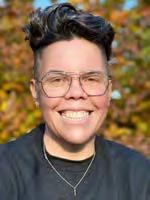
healthcare across the entire lifespan and a wide range of health processes and conditions. The disproportionate impact of violence, hatred, and discrimination means that LGBTQIA+ patients are less likely to access care, less likely to receive equitable care, and less likely to have excellent health outcomes after care.
What is the ethical implication for nurses? Nursing is founded on principles of autonomy, beneficence, and justice. But what happens when federal policies directly contradict these ethical standards? Historically, nurses have played a critical role in advancing LGBTQIA+ health equity. From supporting patients during the HIV/AIDS epidemic to advocating for inclusive health care policies, nurses have always been at the frontlines of patient-centered care. Today, the need for nurse advocacy is greater than ever.
The question is: Will nurses remain silent, or will we fight back? Nurses are not powerless in the face of these restrictive policies – there are concrete steps they can take to continue protecting LGBTQIA+ patients. In fact, not only are we powerful, but we are also obligated by our profession to speak up for our most vulnerable patients, clients, and families. Education itself is a form of resistance; by deepening their understanding of LGBTQIA+ health disparities, nurses can ensure that even in hostile environments, they provide informed, respectful care.
This EO sent shockwaves through health care institutions nationwide. Major hospitals in New York, Los Angeles, and Washington, D.C. abruptly canceled transition-related appointments for minors, fearing federal retaliation. These discriminatory policies are not based on research or evidencebased care, and have left thousands of transgender and nonbinary youth stranded, without continuity of care, and at increased risk of anxiety, depression, and suicide. This has created a climate of fear not just for patients but also for providers. Nurses and doctors who once provided compas sionate, empowering care are now being forced to choose between their ethics and employment. Many fear professional censure, legal action, or even the loss of our licenses for simply following protocols and guidelines set by respected organizations like the American Academy of Pediatrics and the American Medical Association.
Restrictive laws like the recent EO not only harm patients but also undermine the trust that is central to nursing. LGBTQIA+ youth already face disproportionately high rates of discrimination in healthcare settings. Adding legal barriers to essential medical services further exacerbates their distress and erodes confidence in the health care system.

This EO is just the beginning of the impact of our current political climate on LGBTQIA+ health and well-being. Stigma, discrimination, and outright hatred will continue to impact health and
Nurses are facing an increasingly harsh reality under these policies. In hospitals and clinics across the country, administrators – fearful of losing federal funding – are implementing restrictive internal rules that prevent nurses from providing gender-affirming care, even in an advisory or supportive role. Those who dare to advocate for their LGBTQIA+ patients risk disciplinary action, job loss, or even legal consequences. This hostile environment is leaving many nurses grappling with profound moral distress, forced to stand by as patients are denied the life-saving care they so desperately need. The very principles that guide the nursing profession – compassion, advocacy, and ethical care – are now being threatened, putting both providers and patients in an untenable position.
Advocacy must happen at every level, from joining professional organizations like the American Nurses Association to working with LGBTQIA+ health coalitions that fight back against harmful legislation. Even within federal constraints, nurses can create safe spaces through compassionate language, active listening, and connecting patients with trusted community resources. Beyond the bedside, nurses can take legislative action – testifying before lawmakers, joining advocacy campaigns, and supporting lawsuits that challenge these discriminatory policies. In a moment when LGBTQIA+ health is under siege, nurses must stand firm in their ethical commitment to equitable care for all.
We are at a turning point. If nurses do not take a stand now, the erosion of LGBTQIA+ health care will only accelerate. The next four years could see the dismantling of decades of progress in patient rights, and the most vulnerable among us will suffer first. Nursing is not, and has never been, about compliance with political ideology – it is about caring for patients with dignity, respect, and evidencebased practice. The question is not just whether we are willing to stand up for LGBTQIA+ patients but whether we are willing to defend the integrity of nursing itself.
The time to act is now. Our voices matter. Our advocacy matters. It’s up to you. t
Jan Oosting, Ph.D., RN-BC, is an associate professor of nursing at City University of New York (CUNY) School of Professional Studies. She identifies as a member of the LGBTQ community.
by Matthew S. Bajko
For 17 years, Oakland City Councilmember Rebecca Kaplan has provided a lesbian voice on the East Bay city’s governing body. First as its elected at-large member, Kaplan has continued to do so this year as the appointed District 2 council representative.
Opting not to seek reelection last year to her citywide seat, Kaplan was tapped in January to fill the district-based seat on an interim basis by the councilmembers after the departure of Nikki Fortunato Bas due to her election last November to the Alameda County Board of Supervisors. A special election is being held April 15 to decide who will serve out the remainder of Bas’ term through 2026.
Among the six candidates running is Charlene Wang, a lesbian currently on administrative leave from her job advising the federal Environmental Protection Agency on civil rights and environmental justice matters. She ran unsuccessfully last year for Kaplan’s at-large council seat.
Should she now win the District 2 seat, Wang would serve alongside the winner of that race, queer at-large City Councilmember Rowena Brown, and queer District 4 City Councilmember Janani Ramachandran. Wang, who also identifies as queer and whose family is of Chinese descent, would join Ramachandran in being one of only a handful of LGBTQ female Asian American and Pacific Islander elected officials in the Bay Area.
“I will be one of the very few Asian lesbians in office. It would just be an honor to have that recognition amid the need to uplift rare voices in politics,” noted Wang, 34, in a recent interview with the Bay Area Reporter. “Also, just beyond that, Oakland is just in some dire straits. I have experience working with and reforming government at the local, state, and federal levels.”
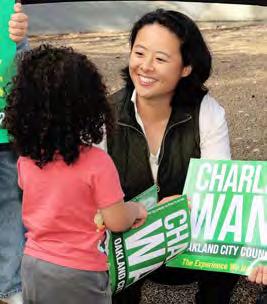
Already difficult enough to gain voters’ attention for a special election, the council race has been overshadowed by the special election for Oakland mayor between top candidates former congressmember Barbara Lee (D-Oakland) and secondtime contender Loren Taylor. In 2022, Taylor had lost to Sheng Thao, who was recalled as mayor on last year’s November ballot amid a wide-ranging federal corruption probe into Alameda County politics that saw FBI agents raid her home last summer.

Ramachandran this month endorsed Wang. Former District 2 council member Abel Guillen, who identifies as Two Spirit, also is supporting Wang in the race.
In recent weeks, Wang also picked up sole endorsements from statewide LGBTQ civil rights organization Equality California and the LGBTQ Victory Fund. The national political action committee that works to elect LGBTQ office seekers named her one of its 2025 “Essential Voice for Equality” candidates.
“Electing an AAPI member of the LGBTQ community, and one who is female, is important. But not only that, it’s not about empty tokenism, we are excited about her viability and passion and what she will bring to public service,” said newly hired Victory Fund CEO and President Evan Low, a gay former state Assemblymember from the South Bay.
Others seeking the District 2 seat include chef Kanitha Matoury, who also lost her bid in November for the at-large council seat, and director of Terner Lab’s Housing Venture Lab Kara MurrayBadal, who is endorsed by Bas. Williams Chapel Baptist Church senior pastor the Reverend Kenneth Anderson, consultant Harold Lowe III, and commercial property manager Paula Thomas also are on the ballot next month.
As voters in the district will be able to rank their choices on their ballots, the candidate who ends up with more than 50% of the vote will be declared the winner. Wang told the B.A.R. most people aren’t aware there is an election for the seat that covers Oakland’s Jack London District, the LGBTQ cultural district based around Lakeshore Avenue by Lake Merritt, and the neighborhoods of Crocker Highlands, Trestle Glen, Cleveland Heights, Bella Vista, Highland Terrace, San Antonio, Clinton Square, Eastlake, and Chinatown.
“If you look at the people who vote in special elections, the Asian American community is not well represented. One of my challenges is to mobilize people,” said Wang.
“I see opportunity with the vacancies to fill in those spots with things that serve the LGBTQ community,” said Wang. “This is the LGBTQ district; gosh darn we need to have some more things owned by LGBTQ people.”
With not having to be at her federal job at the moment, Wang has been able to devote most of her time to canvassing the district and talking to voters. She is also taking part in house parties where people can posit “hard questions” for her to answer, said Wang.
“People are sick given what is hap pening in Oakland. They don’t want platitudes or sound bites. They want real solutions because so much crap is going on here in Oakland,” said Wang.
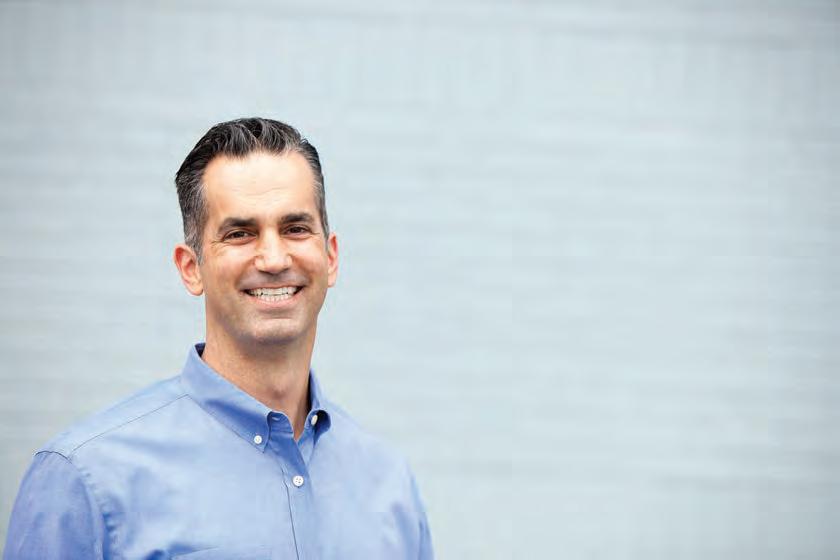
To learn more about Wang, and her plans to address various issues, visit her campaign website at https://www.charleneforoakland.com/.
The League of Women Voters of Oakland is hosting candidate forums this Saturday, March 15, for the special election races. The District 2 one begins at 11:30 a.m., while the mayoral one starts at 1 p.m.
For information on how to watch them, visit https://www.lwvoakland.org/ special-election-2025.
LGBTQ nod trifecta for gay San Jose council candidate
“I am not endorsing in the mayor’s race. I am staying neutral, as I can work with whoever wins,” Wang told the B.A.R. Born in Austin, Texas, Wang moved to the Bay Area with her family at age 4 and lived in various cities in the East Bay. They moved into a dilapidated, foreclosed house in Lafayette when she was 7 years old, and Wang would go on to graduate from Campolindo High School in Moraga.
“From a class and race perspective, I did not fit in. My maternal grandparents lived in Oakland, and I felt a lot more connected and a sense of belonging in Oakland, especially in Chinatown and its working-class Asian community,” recalled Wang, who played the violin with the Oakland Youth Orchestra based at Laney College.
Both her parents were born in China and came to the U.S. for college as biology students. Her father, with whom she is estranged, was abusive to her mother and sexually abused Wang as a child; her maternal grandparents, now both deceased, offered her respite from the abuse and a chaotic home life.
“In many ways those weekends here in Oakland provided me a sense of safety, some stability and also a sense of belonging,” recalled Wang, who would go on to be a board member for the Oakland nonprofit Family Violence Law Center.
She graduated with honors from Columbia University with a degree in environmental engineering and earned her master’s in public policy from Harvard University’s Kennedy School of Government. She worked to reform the state of Massachusetts’s response to homelessness, particularly for unhoused youth, advised Boston’s mayor and later was a Biden administration appointee at the U.S. Department of Transportation, working on a $4 billion national program to reconnect communities segregated by highways, such as Oakland’s neighborhoods divided by Interstate 980.
Single, Wang lives with her 10-yearold mixed breed rescue dog, Galvi, in the Eastlake/San Antonio district, having relocated from Washington, D.C. in 2023 for her EPA job. As many of the same issues that propelled her to enter the at-large council race are paramount in District 2, from housing costs and public safety to support for local businesses, Wang told the B.A.R. it made “total sense” for her to enter the special election. She wants to help bring about a more vibrant Chinatown, particularly in the evenings. Wang also would like to see more LGBTQ-owned stores open in the Lakeshore area, in particular a bar or nightlife venue.
In his own special election for a seat on the San Jose City Council, gay planning commission chair Anthony Tordillos has picked up an LGBTQ trifecta of support for his candidacy. In addition to having sole endorsements from EQCA and the Victory Fund, which also named him one of its “Essential Voice for Equality” candidates this year, he also picked up the support of BAYMEC, the LGBTQfocused Bay Area Municipal Elections Committee.
Low, who has met Tordillos on several occasions, told the B.A.R. that “his service as a leader and chair for the planning commission helps to reflect his key core competency on understanding the substantive nature of policy.”
In a post on his Threads account, Tordillos said he was “humbled” to be endorsed by the three political groups that work to elect LGBTQ people to public office.
“It wasn’t that long ago that some of us wondered if we’d ever see another gay councilmember in San José after the scandal last year. I’m incredibly grateful that our LGBTQ+ community has put their faith in me to restore trust in local government,” wrote Tordillos.
He is one of seven people running in the April 8 election for the District 3 seat that covers much of the South Bay city’s downtown area. Should no one secure more than 50% of the vote, then the top two vote-getters will face off in a June 24 runoff.
Gay former councilmember Torres resigned from the seat last fall after being arrested on child sex crimes charges. Elected in 2022 as the first gay Latino and out person of color to serve on the council, Torres is next scheduled to appear in court April 28 as his case moves towards trial.




Engineering firm owner Carl Salas is serving as the interim appointed District 3 councilmember until the special election is decided. Among the top candidates with Tordillos are Gabriela “Gabby” Chavez-Lopez, a Latina mom who heads the Latina Coalition of Silicon Valley, and Matthew Quevedo deputy chief of staff to San Jose Mayor Matt Mahan
Last week, Tordillos joined other LGBTQ advocates in denouncing Governor Gavin Newsom’s remarks against trans athletes on the debut episode of his new podcast (See story Page 1). In a post on Threads Tordillos wrote that, “Newsom’s comments on his podcast were incredibly disappointing to say the least. You deserve elected officials that aren’t afraid to do the right thing and protect everyone in our community, in spite of political pressure. That’s why I’m running.” t
DEADLINES: Friday 12 noon for space reservations Monday 12 noon for copy & images
TO PLACE: Call 415 829 8937 or email us at advertising@ebar.com
*Non-display Obituaries of 200-words or less are FREE to place. Please email obituary@ebar.com for more information.

Newsom isn’t engaging in open dialogue or debate; he is recalibrating his political stance to make targeting transgender people seem palatable, selling that shift to his base as a strategic necessity. And he’s doing it by giving one of the most notorious anti-LGBTQ+ extremists a seat at the table.”
Newsom defended Kirk as guest
In an email promoting his podcast sent out Thursday, Newsom defended having Kirk as a guest.
“Now you may be wondering, what the hell am I doing talking with Charlie Kirk – one of the key architects of the MAGA Movement? Well, this is not going to be your typical podcast,” wrote Newsom. “It’s not unlike how I went on Sean Hannity’s show and debated Ron DeSantis on Fox News. We’re going to be talking to people we agree with, and also people we disagree with.”
The Bay Area Reporter reached out to several transgender leaders in the Golden State for comment about Newsom’s remarks. They either have yet to respond or declined to comment because they had not heard the governor’s podcast.
Former San Francisco supervisor Bevan Dufty, a gay dad to a young adult trans son who was an ally of Newsom’s at
To which, Jones quipped, “especially with the JP Morgan Healthcare Conference,” referring to the January 13-16 confab. (The strike came to an end December 24.)
Lurie thanked Jones for the compliment and suggested they get coffee.
Despite that early success for Lurie prior to his inauguration on January 8, the city’s challenges – from street homelessness to provocations from the Trump administration – remain salient.
As the Bay Area Reporter reported the day prior to the mayor’s Castro stroll, there was some talk at the March 6 Castro Merchants Association meeting that open air drug scenes and unhoused people had merely moved from the Civic Center Plaza and the Sixth Street corridor to other neighborhoods amid ongoing crackdowns by police in the downtown area.
Asked how he’d deal with these concerns, Lurie told the B.A.R., “We should do the same thing here we have done on Sixth Street, which is make sure we get people off the street and into mental health treatment beds, which is going to take us time. It’s going to take us time on Sixth Street; it’s going to take us time on 16th and Mission.”
Police Chief William Scott explained to the B.A.R. last month that the plan is to provide permanent support from nonprofits like Urban Alchemy once police come into a neighborhood in an attempt to improve street conditions.
“This is an all-hands-on-deck approach,” Lurie said last week. “There is going to be displacement, but the idea is we’re going to go everywhere around this city.”
Lurie is making good on a campaign promise for a 24/7 police-friendly stabilization center, which will be at 822 Geary Street. The 16-bed facility is slated to open in April.
Tough budget year looms
Throwing a potential wrench in Lurie’s plans is that the city must deal with a projected $840 million budget deficit. In order to balance the budget, Lurie asked city departments to slash 15% of their budgets.
Federal funds for the liberal city are in jeopardy with Republican President Donald Trump and the GOP controlling the purse strings in Congress. The San Francisco Chronicle reported March 10 that Lurie sent City Attorney David Chiu, Director of Transportation Julie Kirschbaum, and other local leaders to the nation’s capital to lobby against budget cuts.
Meanwhile, several local LGBTQ
City Hall, noted that the governor made no mention of having spoken to families like his own or to trans athletes before staking out his position against them on the podcast.
“What’s most concerning is that there was no mention of the Governor talking with young people and parents who are the most affected by the statement he issued today,” Dufty told the B.A.R. “There is so much that’s broken in our country and our state. And this is what’s at the top of the list? The lack of humanity towards a very vulnerable population will put more trans youth at risk for suicide and isolation.”
Tony Hoang, the gay executive director of Equality California, stated that the statewide LGBTQ civil rights organization is “profoundly disappointed and angered by Governor Newsom’s comments about transgender youth and their ability to participate in sports.
Transgender kids – like all kids – deserve the chance to play sports alongside their teammates and learn important values like leadership, teamwork, and sportsmanship. Transgender young people deserve to be treated with dignity and respect.”
Human Rights Campaign President Kelley Robinson also expressed deep concerns about Newsom’s comments.
“When LGBTQ+ lives are under attack, real leaders don’t hedge – they fight. Across this country, extremists are stripping away rights, banning books, and
targeting trans kids just for being who they are. This is not the time for political calculations or playing it safe – it’s time to be bold, to stand up, and to say unequivocally: we will protect LGBTQ+ people with everything we’ve got,” stated Robinson, a queer woman who leads the national LGBTQ rights organization. “The fight for equality has never been easy, but history doesn’t remember those who waver – it remembers those who refuse to back down. Our message to Gov. Newsom and all leaders across the country is simple: The path to 2028 isn’t paved with the betrayal of vulnerable communities – it’s built on the courage to stand up for what’s right and do the hard work to actually help the American people.”
Newsom’s comments come as he is widely expected to run for president in 2028. It is the latest example of him striking a more moderate or center-right position as he attempts to mold his national reputation ahead of any campaign for the White House.
Gabriel Haaland, a trans resident of Asheville, North Carolina who was a former president of San Francisco’s progressive Harvey Milk LGBTQ Democratic Club, told the B.A.R. that Newsom’s comments come off as “a nasty way” to launch a presidential bid. He chastised Newsom for falling into a “Republican trap of talking about trans issues” and not about what truly matters to Americans, like the sky-high prices of eggs and groceries.
“We are 1% of the population. Why is he focused on us?” asked Haaland, who back in the late 1990s and early 2000s worked for a labor union and didn’t know Newsom well when he was in local office. “I really resent him stoking the fires of bigotry when we are tragically under attack and in physical danger.”
Despite his earning wide plaudits for bucking state law shortly into his first year as San Francisco mayor in 2004 by ordering city officials to marry samesex couples, in addition to numerous pro-LGBTQ positions and high-profile appointments he has made as governor, Newsom has also received criticism for vetoing a number of LGBTQ bills during his gubernatorial tenure.
Just last fall he axed legislation that would have established a statewide commission on LGBTQ issues and another bill that would have required various medical boards in California expedite the medical licensure of out-of-state doctors who provide gender-affirming care. Two years ago, he vetoed a bill that would have mandated state judges hearing custody suits to take into consideration the needs of trans youth, particularly if their parents or legal guardians were affirming of the child’s gender identity.
The issue of trans sports participation has roiled politics and courthouses in recent years. Both straight and trans student athletes have filed lawsuits over the matter, while Democrats in the U.S.

and AIDS service nonprofits (including the San Francisco Community Health Center and the San Francisco AIDS Foundation) are suing the Trump administration over stop-work orders or termination notices for federal funds that happened after the president signed a number of executive orders targeting certain health services, as the B.A.R. previously reported.
Asked if there’d be city funds available should the nonprofits’ lawsuit be unsuccessful, Lurie said, “I cannot speak on pending litigation matters, but listen, we’re going to be going through a really challenging budget time, and we need to fund those nonprofits that are effective and efficient. We got three months and we’re going to be having conversations with [gay Board of Supervisors President and District 8 supervisor] Rafael Mandelman and the other supervisors, so we have a lot of work to do.”
As the B.A.R. previously reported, Mandelman is among those who have made clear they feel the best way to stand up for San Francisco values is to show it’s governable by focusing on public safety and boosting small business.
He supported Lurie’s move to remove Max Carter-Oberstone, a progressive whom critics charged was an obstructionist, from the police commission ahead of Scott’s rumored departure. Since the departure of lesbian Debra Walker from the oversight body late last
year, it has no LGBTQ members, and neither of Lurie’s two appointments are LGBTQ.
Asked about committing to appointing queer commissioners, Lurie said that one can’t extrapolate based on these two appointments.
“100%,” he said, when asked if he’d commit to LGBTQ appointments. “Absolutely. We are committed to it, and it continues to be a priority. People shouldn’t read into two appointments.”
Mayor promotes 24/7 mindset
Jones wasn’t the only one happy to see Lurie in the neighborhood. He was joined on the walk by Mandelman, Mission Station Captain Liza Johansen, and members of the Castro Merchants Association’s board.
“I think it’s awesome he came to the Castro,” said Merchants president Terry Asten Bennett, a straight ally who coowns Cliff’s Variety. “We asked him to come, and he came. It’s important for him to see the street conditions here. Our street conditions change by the hour and day.”
Lurie visited such businesses as Cliff’s, Eureka Sky, the Castro Coffee Company, and Hot Johnnie’s, He also stopped by the Castro Country Club, a sober gathering place on 18th Street, where he had a brief back patio meeting with Billy Lemon, a gay man who leads the non-
Senate earlier this week defeated a bill that had been passed by the House and would have banned transgender youth participation in sports on teams that align with their gender identity, as the B.A.R. reported.
Last month, U.S. Attorney General Pam Bondi warned three state attorneys general – including California’s – they must comply with Trump’s executive order on transgender girls and women’s participation in female sports.
The federal Education Department also announced February 12 an investigation of the California Interscholastic Federation – the state’s governing body of high school sports – as a result of its current pro-trans athlete policies.
Both stemmed from Trump’s executive order he signed February 5 titled “Keeping Men out of Women’s Sports,” which states it is U.S. policy to rescind all federal funds “from educational programs that deprive women and girls of fair athletic opportunities, which results in the endangerment, humiliation, and silencing of women and girls and deprives them of privacy. It shall also be the policy of the United States to oppose male competitive participation in women’s sports more broadly, as a matter of safety, fairness, dignity, and truth.”
It is being challenged by trans students and their families in federal court. t
able to have impact and bring people together. I think, honestly, one the biggest surprises, we have to become a city government that really thinks of itself as engaged and on 24 hours a day, seven days a week. There’s too often we turn off as a city at 5 p.m. on Friday and we wait till Monday to get back.”
Having a round-the-clock mindset is critical, said Lurie, in a city where tourism is the number one industry.
“We got people working Saturday and Sunday who need the Muni stations cleaned,” noted Lurie, adding that his administration is “building a culture that we need to lean forward, staff, really focused on those tourists, those visitors and our families. Breaking through that and being aligned on that, that’s been one of the big challenges or surprises.”
One way the Castro might be attracting some of those tourists in the future is through the forthcoming LGBTQ history museum at 2280 Market Street, as the B.A.R. has reported.
Mandelman told the B.A.R. during the merchant walk that the city is still working on the lease to be sent to the supervisors for their approval, and that it may take several months.
Castro Theatre work resumes
profit facility.
“I think the mayor is doing a really good job listening to constituents,” Lemon told the B.A.R. afterward.
Two people drinking coffee on the patio of the club shared their views.
“I’m very grateful he won,” Mark Stockbridge, a gay man, told the B.A.R. “I think he can do it. I firmly believe he can do it.”
Ray Crist, another gay man, is warming up to the new mayor, an heir to the Levi Strauss fortune who had no political experience prior to moving into Room 200 at City Hall other than overseeing local poverty-fighting nonprofit Tipping Point.
“I was against him,” Crist said. “All the money in politics doesn’t sit right. But he seems to be a fine guy, talking about the right things.”
Lurie spent $8.9 million on his own campaign, in addition to almost a million dollars in small donations, the San Francisco Examiner reported.
For his own part, Lurie said nothing about the job is really surprising him –except for how much he likes it. The Castro was one of several neighborhoods he visited last weekend that made an appearance on his social media accounts.
He said he wants to make sure the city government employees are cognizant of their need to stay responsive on weekends and after regular business hours.
“I love the job,” he said. “I love being
As Lurie walked by the Castro Theatre – currently shuttered for renovations – he was approached by Derrick Connolly, a gay man, who told him about construction delays that theater manager Another Planet Entertainment blamed on the Pacific Gas & Electric Co., but that the utility said was due to last minute changes by APE, as the B.A.R. previously reported.
“You would get a lot of bonus points in this neighborhood if you could help,” Connolly said.
The B.A.R. followed up with gay APE spokesperson David Perry, who stated March 10 the issue with PG&E has been resolved and that construction is moving forward. The opening, which had been originally announced as June 2025, will be at the end of the year, or after, Hoodline reported the same day.
“We have been working tirelessly in partnership with PG&E to bring the much-needed electrical service into the theater to support the theater’s programming,” Perry stated. “Work has already commenced and will continue until the job is complete.”
Shortly after walking by the theater, Lurie, Asten Bennett and Mandelman were at Cliff’s making an Instagram story for the mayor’s prolific social media account.
“They’ve got everything from puzzles to feather boas,” Lurie touted. t
by Gregg Shapiro
Singer/songwriter Janis Ian will always have a special place in my heart. Janis was the first artist I ever interviewed at the beginning of my journalism career. It was 1994, after the release of what some considered to be her comeback album, “Breaking Silence.” She couldn’t have been more delightful or forthcoming.
Although many know Ian from her hit single, “At Seventeen,” it was actually from her seventh album, and the singer-songwriter has been performing since the 1960s. Adding to her burst of fame was her performance in the 1976 premiere episode of “Saturday Night Live.”
Over the years, Ian has won multiple awards, and has been outspoken about financial and management abuses in the record industry. She came out officially in 1993 and lives with her wife Patricia Snyder on Anna Maria Island, Florida.
Now retired from touring and recording, Ian, 73, is the subject of Varda Bar-Kar’s informative documentary “Janis Ian: Breaking Silence.” Janis was, once again, kind enough to make time for an interview shortly before the release of the documentary, “Janis Ian: Breaking Silence,” will be in theaters March 28.
Gregg Shapiro: Janis, I’d like to begin by asking you to say a few words about how the documentary “Janis Ian: Breaking Silence” came to be?
Janis Ian: I’ve been offered the chance to tell my story in documentaries since I was 16. It was not something that I was looking for. I figured that between touring starting to wind up, and my life starting to kind of wind down, it was a good time
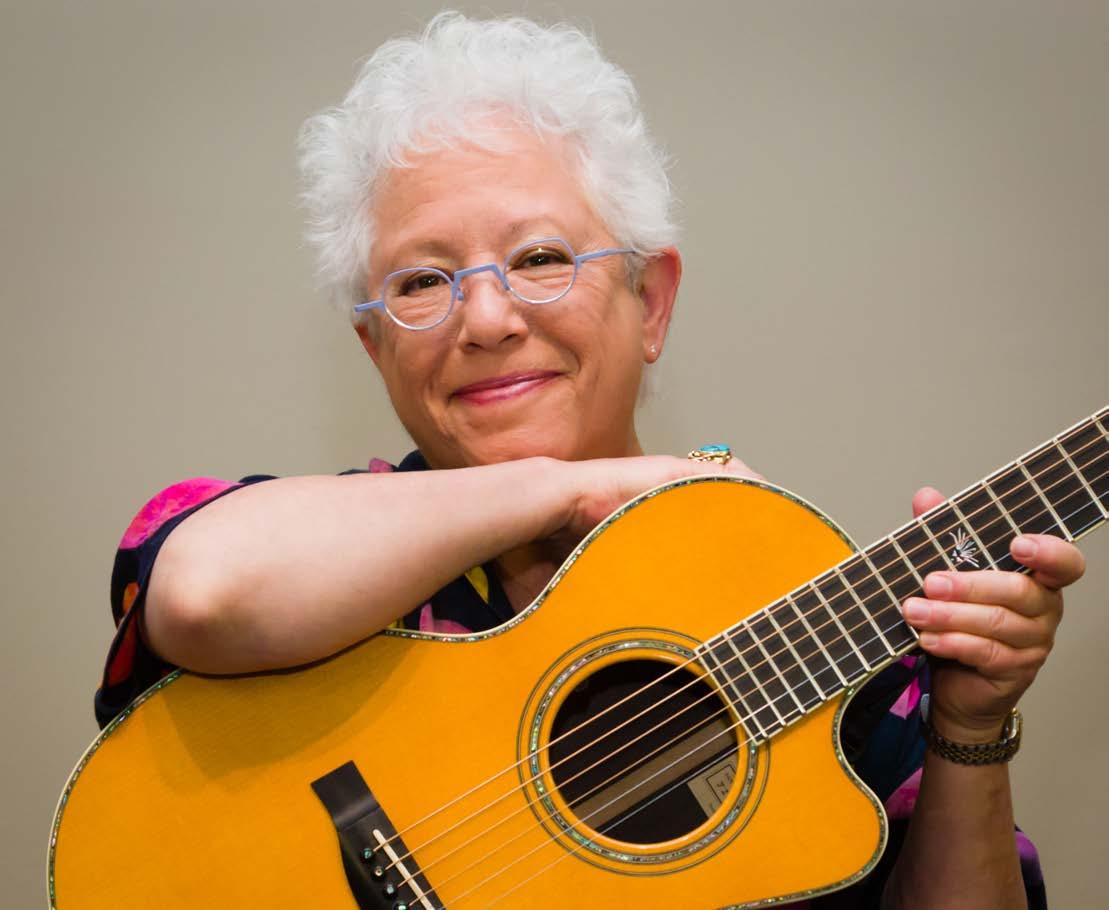
to release the last album and then go quiet. That was my plan.
Then, I got approached by a fairly big company to do an autobiography. The point they made was that this is an autobiography, it ties in with your archives, it’s good for people to understand, and so on. I signed (it), and then the company completely changed. I waited out the contract and walked away. I thought, “Well, this is not meant to be, clearly.”
But then Varda approached me. She sent me an email and I spoke with her out of courtesy. She
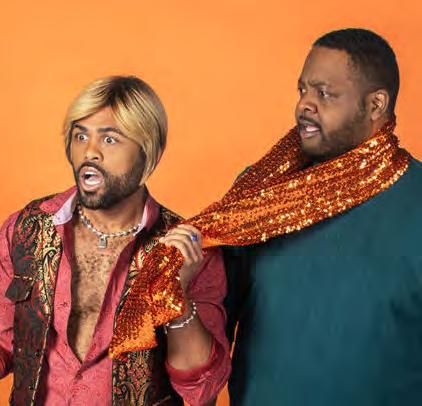
by Jim Gladstone
Major productions of two contemporary comedies with gay Black lead characters are being mounted in San Francisco this month. And in an unusual coincidence, earlier stagings of both are available in polished recorded versions from Audible, giving local theater afficionados the unusual opportunity to get to know the shows prior to seeing them in person.
Already in previews, with opening night scheduled for Saturday, March 15, is “Wild with Happy,” written by local theater veteran and recent Oscar-nominee Colman Domingo, at New Conservatory Theatre Center.
Performances of the 2022 Pulitzer Prizewinning “Fat Ham,” Philadelphia playwright James Ijames’ contemporary South Carolinian spin on “Hamlet,” begin at the San Francisco Playhouse on March 20. Audio versions of prior productions ($6.96) can be downloaded via Amazon or Audible.
For your ears only
Listening to an audio version of a play is by no means a substitute for the multisensory experi-
was so enthusiastic and so understanding that I said, “Okay, let me see your previous work.”
She sent me links to the previous work and then my lawyer said, “Okay, you need to show me a 20-minute idea of what you’re going to do.”
She did that, and it was interesting. So, I kept talking to her. We were at the start of COVID and nobody knew what was causing it. She said she would put on a hazmat suit and fly out, and I said, “No. You’re not getting within 20 feet of me.”
We kept talking and the more she talked about her ideas for it and the more she understood what

ence of live theater. Stage productions are perhaps the most collaborative of all art forms, and a sound recording omits many key aspects of a live performance. The contributions of costume, set, prop, and lighting designers, along with all the visual elements of acting are absent.
So too are those of the most essential collaborators –fellow audience members– whose collective engagement and simultaneous reactions adds an ineffable but ineluctable richness to theatergoing.
But the creation of every production begins with a script. And focusing on the words, spoken in isolation, before seeing a show on stage, can provide a valuable baseline familiarity with the play.
It not only eases comprehension of rapid-fire live dialogue (an ability that’s been eroded by the rewind and subtitle functions of streaming video) but it also allows you to more deeply appreciate the ways that the director, actors, and designers of the production you attend build upon, interpret, and enrich the playwright’s work.
Get happy
“Wild With Happy” tells the story of Gil, a 40-year-old gay man comically coming to terms with himself and opening up to romance in the aftermath of his mother’s unexpected death.
The audio version is entertaining ear candy, directed by and starring Domingo himself as Gil with Oprah Winfrey (who shared the screen with Domingo in “The Color Purple”) as his mother, Adelaide, and Sharon Washington as his Aunt Glo.
One notable difference in the NCTC production (and all stage versions to date) is that Adelaide and Glo are both being played by the same actress (Here, Carla Banu DeJesus).
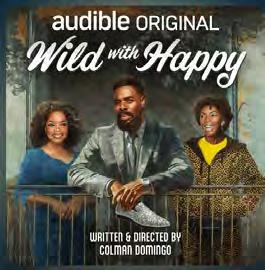
I wanted out of it, which was a slice of the times, the more comfortable I got until I finally said, “Okay.” It’s a very straightforward deal. I don’t get any money for it. She agreed to give me – not approval of the rough cut – but the right to request factual corrections in the rough cut. There are a few of those. Otherwise, the first time I saw it was pretty much along with everybody else in its finished formed during my Berea (College) archives opening.
Another is that the 90-minute one-act includes rapid flashbacks and shifts of location (including a funeral home scene, road-trip vignettes that take place in a car, and a Disneyworld finale). In the audiobook, clever sound design does the heavy lifting, but it should be fascinating to see the same quick changes executed visually.
As funny as the script is, it also has a tender side that gets short shrift in the exaggerated almost clownish performances on the audio version, which occasionally verge on Tyler Perry territory. The talented ShawnJ West, who is directing at NCTC, has said he’s scrupulously avoided being influenced by past productions, so it will be interesting to see if he opts for a bit more emotional realism.
“Fat Ham” is a magnificent linguistic feast that simultaneously serves up two rich forms of English: Black and Shakespearean. Playwright Ijames (pronounced Iams) gleefully embroiders on “Hamlet” in scenes, dialogue, and soulful soliloquies when it suits him, but freely departs from the Bard elsewhere.
Moody young Juicy, a queer man studying for an online Human Resources degree at the University of Phoenix, is due for a major attitude adjustment when his late father’s ghost and his boyhood crush both show up at a backyard barbecue wedding. A melee of conflicted masculinity ensues. Then, a surreal sexual fantasy leads to a mind-bendingly meta wrap-up.
Between the density of its cross-textual references and the ribald jokes that will have audiences laughing so hard that some dialogue will inevitably get lost, this is an ideal play for pre-listening. The audiobook version features the cast of the 2023 Broadway production, led by Marcel Spears as Juicy (Devon A. Cunningham will play the role under Margo Hall’s direction at SF Playhouse). And while you needn’t have a scholar’s familiarity with “Hamlet” to have a blast at “Fat Ham,” you can find audiobook versions of the Shakespeare’s original online, too.t

“Wild With Happy” through April 6. $25-$72.50. NCTC, 25 Van Ness Ave. www.nctcsf.org
“Fat Ham” through April 19. $20-$130. SF Playhouse, 450 Post St. www.sfplayhouse.org
by David-Elijah Nahmod
Like many LGBT people, Lisa Geduldig is horrified by the actions of President Donald Trump and his sidekick Elon Musk. Geduldig, a well known stand up comic in the Bay Area, isn’t going to be silent about what’s going on. To that end she’s creating, hosting and performing in a new monthly show called “Resistance Comedy.” The series will kick off on March 23 at the Eclectic Box, a small theater in San Francisco’s Mission District.
It hasn’t been an easy year for Geduldig. A few months back she lost her beloved mother with whom she had spent a great deal of time during the pandemic. As the pandemic raged Geduldig produced Lockdown Comedy, a regularly scheduled online comedy show where her mother became a popular performer. Still mourning her mother’s passing, Geduldig was blindsided by Trump’s presidential victory and decided that her voice needed to be heard.
“With all the drek that’s going on now with the Drumpf/Muskrat regime, I decided that the series needed to have a political bent,” Geduldig, a lesbian, said in an interview with the Bay Area Reporter. “We have to stay sane amidst the horrible news every day, and we need to resist, be it through protesting and/or calling elected officials and/or art. Comedy is art and can be a form of resistance, therefore the name. And comedy is healing. It will be cathartic for a group of people to sit in a theater together in the dark and laugh about some of the
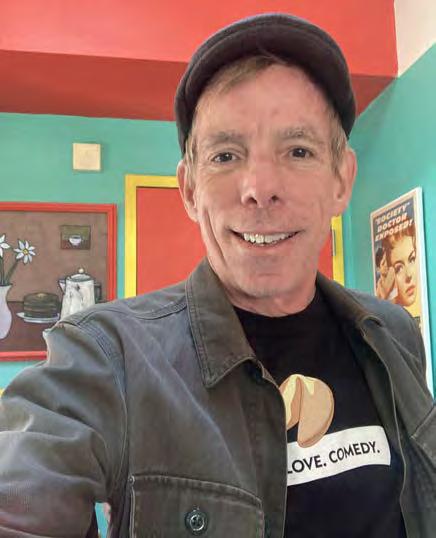
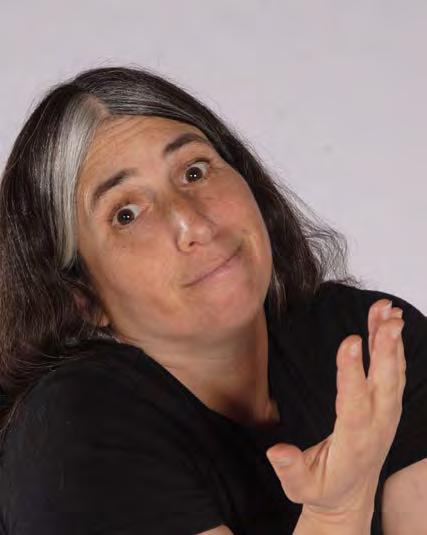
shit going on now, from a comedian’s perspective.”
Partial proceeds from each month’s show will be donated to a different organization. All beneficiaries will be non-profits who fight for civil rights, immigrant rights, women’s rights, trans rights, etc. The first show will benefit the ACLU, the American Civil Liberties Union.
“I chose the ACLU for the first month as they’re in the courts now trying to preserve our democracy,” Geduldig said. “They do vital work.”
Intelligent, funny
As always, Geduldig will be hosting the show as well as performing some stand-up. Other performers who will appear on opening night are Dhaya Lakshminarayanan, Orion Levine, Carla Clayy, and Bob McIntyre, who is a gay man.
“When I book a show, I look for intelligent, funny, original and unoffensive comics,” she said. “People who I also want to hang out with offstage as well. I’m asking all of the comics to do at least some political material in their
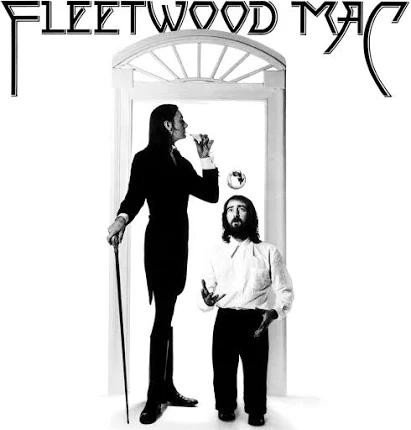
by Gregg Shapiro
Whether you heard them in their original release, or you’re a youngster digging the retro classics, new reissues from historic music groups include Fleetwood Mac, Don Henley (The Eagles), The Byrds’ Gene Clark, plus Diana Ross and The Supremes.
Are you sitting down? The eponymous 1975 Fleetwood Mac album, the first to include new members Stevie Nicks and Lindsey Buckingham following Bob Welch’s departure, was released 50 years ago!
With the three remaining British members (Christine McVie, Mick Fleetwood, and John McVie), and the infusion of that Buckingham-Nicks energy, the Mac, which had been around since 1967, finally achieved mainstream success and acclaim.
Regardless of whether or not such an auspicious anniversary was the reason for the release of the five-CD/ six-LP box set “1975 to 1987” (Reprise/Warner Records), just enjoy the celebration.
“Fleetwood Mac” (aka “The White Album”) not only includes chartbusters such as “Rhiannon,” “Over My Head,” and “Say You Love Me,” but also “Crystal” (which first appeared on 1973’s long out-of-print “Buckingham Nicks” album) and “Landslide.”
Arriving two years later, in 1977, “Rumours” not only proved that the previous album wasn’t a fluke, but im-
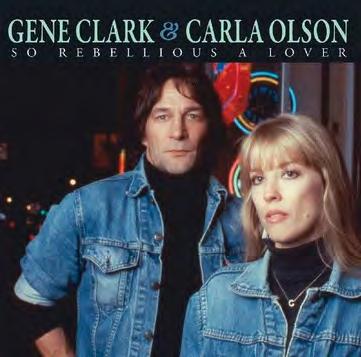
proved on it in ways few could have imagined. The Grammy-winning, multi-platinum recording featured the massive hit singles “Don’t Stop,” “Go Your Own Way,” “Dreams,” and “You Make Loving Fun.”
The aforementioned fun the band was having resulted in legendary substance abuse problems and the disintegration of relationships. Two more years passed before the release of the double LP album “Tusk” in 1979. A more experimental effort than its predecessors, for the first time, the band found itself alienating fans. However, those that stuck with them were rewarded with standout songs, including the hits “Sara” and the title track, to name two.
In between the release of “Tusk” and its 1982 follow-up “Mirage,” a double LP album “Live” was issued (containing the amazing song “Fireflies”) although not included in this reissue, and band members Nicks, Buckingham, and Fleetwood spread their wings and released solo albums (with Nicks’ being the most successful).
Regrouping for “Mirage” proved to be a good thing, as the album topped the charts, powered by hit singles “Gypsy” and “Hold Me.” When the album “Tango in The Night” was released in 1987, marking the last time they would record as a quintet, Nicks and Buckingham’s solo careers were in full bloom. (Even Christine McVie had some success with a 1984 selftitled disc.)
act, but it doesn’t have to be entirely political.”
McIntyre, who also spoke to the B.A.R., may be familiar to many local denizens as he worked for twelve years at the much-missed Sparky’s Diner. He said that while being gay definitely informs his comedy, just being human informs it more.
“It’s pretty clear that I’m a gay man as soon as the words start coming out of my mouth and my arms start flailing but most of what I talk about is everyday stuff like the price of cole slaw on
Valencia Street,” he said. “Or getting on the wrong Muni train convinced that you got on the right train and thinking that you’ve been abducted by aliens.”
McIntyre added that it can be a bit daunting to find humor in the current political climate.
“I’d say that the challenges of finding humor in the current political climate start with doomscrolling,” he said. “I’m very guilty of it. Just like I was last time he was in office. I’ve actually had a hard time writing lately because it’s all just too much. Thankfully I’ve been doing a bunch of work at Eclectic Box lately, doing tech work and house managing and sidewalk scrubbing.”
When he takes to the stage at “Resistance Comedy,” McIntyre will show the audience that humor can be found in the most unlikely places.
“For this show I have a few things,” he said. “I’m going to journey back to a time when life was simpler, the first year of COVID. And I’m going to talk about some of the biggest viral stars of the era who you may have forgotten about. COVID, the good old days.”
“You have to find humor in what’s going on now,” added Geduldig. “You either laugh or you cry. Everything is so absurd you couldn’t write this stuff. And it’s more ‘Saturday Night Live’ than ‘Saturday Night Live’ is. There’s no shortage of material.”t
‘Resistance Comedy,’ Sunday, March 23, 7pm, Eclectic Box SF, 446 Valencia St. $27.50-$54, pay what you want. www.koshercomedy.com www.eclecticboxsf.com
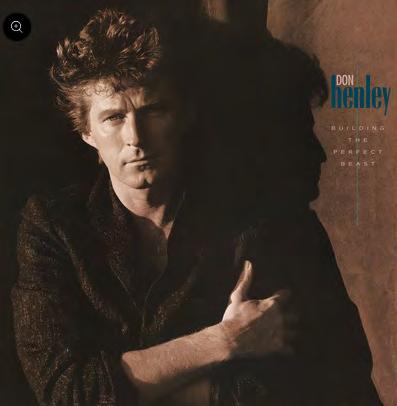
Regrouping once again proved to be fruitful as “Tango” yielded even more hit singles, including “Everywhere,” “Big Love,” and “Seven Wonders.” Keep in mind that this box set only includes studio albums, and the only bonus material can be found in the vinyl box set.
www.fleetwoodmacofficial.com
While three-fifths of Fleetwood Mac were British, they were, nevertheless, considered to be purveyors of the SoCal sound that was so dominant in the 1970s.
Two other bands, The Byrds and the Eagles, were more native to the region. The Byrds, at their peak from the mid1960s to the early 1970s, launched several careers, including those of David Crosby, Roger McGuinn, and Gene Clark. Clark, who died in 1991 at 46, only released a few solo albums and has become an artist rediscovered through reissues of his work.
“So Rebellious a Lover” (Sunset Blvd Records), an album on which Clark collaborated with Carla Olson (of The Textones fame), is one such example. Originally released in 1987, the album sounds like an altcountry precursor. The pair’s voices work well together, and their cover of John Fogerty’s “Almost Saturday Night” is the musical equivalent of a good
time. The powerful song “Deportee (Plane Wreck at Los Gatos),” co-written by Woody Guthrie, is especially meaningful now and is essential listening. This reissue also includes eight bonus tracks. highmoonrecords.com
Of all the Eagles’ members, it’s not too surprising that it was Don Henley who went on to attain the most success and popularity as a solo performer. Beginning with his underrated 1982 solo debut “I Can’t Stand Still,” Henley demonstrated that he was willing to color outside the lines.
However, it was his 1984 follow-up, “Building the Perfect Beast” (Geffen), newly reissued in a remastered, 180gram vinyl double LP 40th anniversary edition, that most perfectly embodied that aesthetic. Album opener and hit single, “The Boys of Summer,” illustrated just how far Henley had put the Eagles behind him. The same can be said for the synthesized keyboards and drums on “All She Wants to Do Is Dance,” as well as the stunning, nearepic “Sunset Grill.” www.donhenley.com
As Henley continued to keep things popping in LA in the mid-1980s, another music scene was on the rise more than 1100 miles to the north in Seattle. Led by the late Mia Zapata
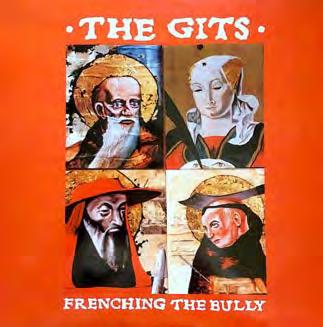
(please Google her name and read her tragic story!) punk band The Gits were Seattle-transplants from Ohio. Although active in the Pacific Northwest music scene, The Gits were neither a grunge nor a riot grrrl band. “Frenching The Bully” (SubPop), The Gits’ 1992 debut album has been given the reissue treatment. The music is as raw as Zapata’s lyrics, sung in her trademark feminist punk belt. Memorable numbers include “While You’re Twisting, I’m Still Breathing,” “Another Shot of Whiskey,” “Cut My Skin, It Makes Me Human,” and “Second Skin.” www.subpop.com
Last, but certainly not least, as Diana Ross continues her concert tour, it’s important to remember that before she was a solo diva, she was part of a trio known as Diana Ross and the Supremes. “Reflections” (Motown), newly reissued on 140gram virgin vinyl, was one of four albums released by the group in 1968. It opens with the wonderful (and semi-psychedelic) title track hit single. The album also includes the hits “In and Out of Love” and “Forever Came Today,” as well as an unexpected selection of nonHolland-Dozier-Holland tunes such as Bobbie Gentry’s “Ode to Billie Joe,” Jimmy Webb’s “Up, Up and Away,” and Bachrach and David’s “What the World Needs Now Is Love.” www.motownrecords.comt



by JIim Provenzano
Complementing recent film docu-
mentaries about The Beatles and even a recent AI-assisted hit single, ‘Paul McCartney Photographs 1963–64: Eyes of the Storm,’ the touring exhibit of the early years of The Beatles’ leap to pop music stardom, are presented in an entertaining layout.
Organized by the National Portrait Gallery, London, in collaboration with McCartney, this is the premiere West Coast installation of the array of 280 photos. From intimate framed portraits of fellow performers backstage, to posterized street shots of their adoring fans, the exhibit offers an intimate look at the three-month period that was the Beatles’ whirlwind concert tour.
McCartney took hundreds of photos while touring the UK, Paris, and their splash in America. Saving them for later, most of the photos have never been seen or published before. The vintage negatives were rediscovered in 2020 when McCartney was working
on the archive of his late wife, Linda, who was a prolific photographer.
McCartney’s style shows a quick eye able to get an interesting frame, more than a snapshot, as with some of his Washington DC photos snapped from a moving car. It is the insider’s take that makes these shots historically important and steeped in nostalgia.
Behind Beatlemania
The exhibit is impressive. Along with large blowups of images of the screaming crowds and paparazzi flood of cameras, small framed images from one to two feet wide are clustered in the various rooms by setting, alternating a deep red with stately blue. The installation wall text is topped off by headers set in McCartney’s handwriting.
Grouped by different city locations where they toured from their first flight to New York City, San Francisco’s Cow Palace concert, and in Miami as well. The Paris room heightens McCartney’s
events.
While you won’t hear any Beatles music in the exhibit, there are short video clips of them on the Ed Sullivan show talking to the host. Small ephemera in display cases (mostly reproductions) include negative strips and contact sheets, some of which are blown up to amusing proportions in another area. Among the reproductions are a scribbled notepad sheet of lyrics for “I Wanna Hold Your Hand,” which McCartney wrote, along with one of McCartney’s cameras. Behind-the-scene shots show John Lennon, George Harrison and Ringo Starr goofing off, playing music and smoking a lot of cigarettes. Their gay producer Brian Epstein and other colleagues smile, smirk, or pose informally. In a few cases, the image, while shot by someone else with McCartney in the frame, are most likely set up by him. (A sidenote: the 2025 documentary “Beatles ’64”

by Gregg Shapiro
Have you ever watched a movie where you could see every plot point coming, but it didn’t matter because the performances by the lead actors were so compelling that you stuck with it? Such is the case with director and co-writer Kyle HausmannStokes’ “My Dead Friend Zoe” (Universal/Briarcliff Entertainment).
“Inspired by a true story” about Hausmann-Stokes’ two platoon mates, “My Dead Friend Zoe” begins during
the war in Afghanistan in 2016. Soldiers Zoe (out actor and filmmaker Natalie Morales) and Merit (Sonequa Martin-Green of “Star Trek: Discovery”) have become inseparable friends in a war zone. The scenes with these two characters during this period are told in flashbacks. In the present-day sequences, Merit is struggling with Zoe’s death, so much so that Zoe is a presence in her daily life. For example, when Merit attends a court-ordered support group, Zoe is nearby, wisecracking about the other

attendees who are veterans.
Merit attends the group, run by Dr. Cole (Morgan Freeman), because she was charged with “criminal negligence” after she dropped a forklift load of TV sets, almost crushing a co-worker at her job. Merit refuses to show up and participate, which means that Cole can’t sign off on the Group Therapy Services Reporting Form from the VA, and that could result in her being at the mercy of the court, where she could be fined or jailed.
Family needs
Further complicating matters are her relationships with her mother Kris (Gloria Reuben) and her Vietnam vet grandfather, Dale (Ed Harris). Kris has asked Merit to look after widower Dale, who lives alone in a cabin in the Oregon countryside, after he was found wandering and appeared to be lost. A doctor even goes so far as to diagnose him with early-stage Alzheimer’s.
“My Dead Friend Zoe” alternates between scenes from the past in Afghanistan and the present in Oregon. The presence of Zoe in Merit’s life (as well as in the movie) adds comic relief to what otherwise would be a heavy story. The pair’s interactions in the war zone do a respectable job of illustrating their bond as both friends and soldiers, especially in the mostly male platoon. There is also a degree of levity in the post-war scenes with Zoe, but the mystery of what actually happened to her lingers like a specter throughout.
One ray of light in Merit’s life is Alex (Utkarsh Ambudkar, of “Ghosts” fame), whose family owns the Shady Acres facility in which Kris wants to
includes scenes of McCartney taking photos.)
Stop by the gift shop for coffee mugs, clothes and accessories, but the choice item is the large book that documents the exhibit ($75).
In these photographs, McCartney was able to capture a shining moment that changed the course of pop music forever. And yet in some photos, it more resembles a quartet of guys just having fun and meeting some nice people.
This is of particular note in the room about their Miami trip, which concluded the band’s tour, and the exhibit. The walls in lime green and peachy orange match the festive nature and relaxation of the poolside Fab Four, in color, unlike most other images, and finally getting a break from their three-month hard day’s night.t
‘Paul McCartney Photographs 1963–64: Eyes of the Storm,’ through July 6, Free/$25. Tue-Sun 9:30am-5:15pm. 50 Hagiwara Tea Garden Drive. deyoung.famsf.org

relocate Dale for his own safety.
But we soon realize that Merit, who is constantly flashing back to her time with Zoe in Afghanistan, is in no position to begin any kind of new relationship. By the time the source of Merit’s Zoe-related trauma is revealed (one of the few surprises in the movie), some audience members may feel like they’ve been through the wringer.
The always dependable Morales
delivers the goods here. The same can also be said for Martin-Green, Ambudkar, and of course, Freeman. On the other hand, Harris continues to gnaw at the scenery, virtually chomping whole pieces of it. Poor Reuben is stuck playing another dour character for whom it is difficult to have any empathy. Rating: Bt
www.mydeadfriendzoemovie.com





by Brian Bromberger
When President Trump signed an executive order that the federal government, in an effort to end “transgender insanity,” would recognize only two unchangeable sexes, he began the long process of legislating transgender people out of existence, such as defunding gender-affirming medical care and banning them from serving in the military.
If only Trump had read Lucy Sante’s memoir of transition (just published in paperback), no one could doubt the reality of gender dysphoria and its deleterious effect on her life. Moments of doubt, shame, unworthiness, and fear were etched within her body. The memoir is a cautionary tale on the perils of suppression and the joy of acceptance.
Despite always identifying as a girl and a woman, it was the genderswapping Face-App she discovered on her phone that gave Lucy the courage to transition. It was an opportunity to see what she’d look like as a woman, as she fed the app, pictures and ID-card images taken of her throughout her whole life. Those snapshots are printed throughout the book.
“She was me. When I saw her, I felt something liquefy in my body. I trembled from my shoulders to my crotch. I guess I had at last met my reckoning.” It was an awakening “when my egg cracked, I simply stopped being able to lie to myself.”
Then/now
The book opens with an email (“A bombshell”) she sent to 30 friends and colleagues proclaiming her gender
Early in “Janis Ian: Breaking Silence,” there is a clip of you in the 1967 TV documentary “Inside Pop: The Rock Revolution,” hosted by Leonard Bernstein. What did it mean to you to be featured in that program?
[Laughs] I don’t remember. I thought it was pretty cool, but it sort of ended there. My parents, I think, were more excited than I was. To me, I didn’t really understand the impact that it could have. I was pretty clueless about that.
So, once it did come out and everybody went, “Oh my God! Oh my God! Oh my God!” then I went, “Oh, Okay.” I didn’t grow up watching a huge amount of TV, so I didn’t really understand the power of an “Ed Sullivan Show” or a primetime special.
Did you remain in contact with Bernstein after that?
Lightly here and there. A couple of books were exchanged. I sent him a couple of notes; he sent back notes. My uncle went up to him at Tanglewood and told him who he was, and Bernstein said that he had been following my career very closely. Then I ended up studying with Stella Adler, whose daughter Ellen married David Oppenheim, who had been the great love of Bernstein’s. It was just one amazingly big circle.
How does it feel to hear Arlo Guthrie, Joan Baez, and many others singing your praises?


identity at age 66, declaring that being a woman “was the consuming furnace at the center of my life.” Her only regret was that she put it off for so long. Her transition ended a 14-year-old romance with a woman after she showed her the Face App photos.
She attempted to salvage the liaison by writing another email almost retracting her previous revelation, saying she was “sticking with Luc for now.” She soon realized there was no turning back even if it ended her relationship. “It was not so much that I had betrayed Mimi’s trust, but that I ever honestly earned it.”
The memoir switches back and forth between past and present, but threads into one story. Born as Luc in Belgium, her conservative workingclass Catholic immigrant parents emigrated to the U.S., settling in suburban New Jersey. They were mourning their
stillborn daughter so they couldn’t embrace Luc, her mother calling Luc by feminine diminutives (when Luc wasn’t going into her mother’s bedroom and wearing her bras, slips, and dresses). She came to hate her mother “so intensely it was almost like love.”
Her gender dysphoria began around age 10. At age 12, Luc won a school essay-writing competition on Arbor Day. In a newspaper clipping listing the winner’s names, a y was added to Luc, a typo which had mammoth repercussion years later. The struggle to transition becoming an American and finding a cultural community parallels her gender transition.
“My secret poisoned my entire experience of life. There was never a moment when I didn’t feel the acute shame of being me, even as I denied to myself that my secret has anything to do with it.”
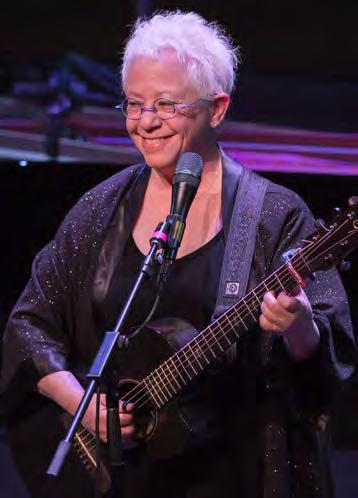
It’s pretty splendid, I will say. My wife once told me that I had to be careful when I talked about my friends. I asked and she said, “You throw around names like Joan and Arlo, and it doesn’t mean anything to you because those people are your friends. But for other people, these are very famous names, and it can sound like you’re bragging.”
I thought, “I have to watch myself now when I talk about my friends.” But she was right. I think somebody in my position, doing it as long as I have, winds up knowing a lot of people that other people don’t get the chance to know.

Bohemian rap Luc became a writer and in the 1970s/1980s aligned with the freespirited Greenwich Village bohemian scene, a punk aesthete constantly high on drugs (mostly amphetamines), working at the Strand bookstore, partying at CBGB and Mudd Club. She formed a band with director Jim Jarmusch, and hung out with other artists like Patti Smith, Darryl Pinckney, Jean-Michel Basquiat, and photographer Nan Goldin. Despite socializing with gender nonconformists and drag queens, she didn’t feel free enough to be herself. She was too frightened and envious of trans people she did meet, to become friends with them.
Luc became editor Barbara Epstein’s assistant at the “New York Review of Books,” giving her “the ability to arrogate unto myself the authority to speak.” Luc published various kinds of literary journalism and newspapers.
Luc later wrote nonfiction books like the classic 1991 urban history “Low Life: Lures and Snares of Old New York,” establishing a name with her exceptional prose.
“Writing became the principal signifier of my male identity and gradually my social personality became coextensive with my work. My work didn’t reflect me; I reflected it.” She taught at Bard College for 27 years. She even wrote a memoir but avoided any “self-depiction because I didn’t want to be seen and I didn’t want to be seen because I didn’t know who I was.”
Luc was deeply attracted to women, afraid they would reject her if they knew she was trans. She married twice and parented a son. It was her “inability to square my gender identity with
In the film, gay journalist James Reed described you as an LGBTQ icon. What does such an accolade mean to you?
Nothing [laughs]. What’s an icon? An icon is something you put on the dresser and pray to. I understand what he was trying to say. I think anytime you make somebody an icon, it’s a great danger to that person. I don’t think of myself in that way. I think we’ve talked about this before.
People keep telling me when they see the film how brave I was. To me, it’s mostly accidents. I was there, and I did the right thing. If you stop and think, “Am I going to be brave about this or not?” therein lies perdition. If you think about it too long, you get scared.
I also enjoyed listening to the late music producer Brooks Arthur talk about your collaboration.
I think I was remarkably fortunate in (working with producer) Shadow (Morton), and Brooks was the engineer under Shadow. I was incredibly fortunate in that both thought I could do anything.
If you listen to (the album) “Stars” or most of “Between the Lines,” after I fired the lead guitarist, we suddenly realized we didn’t have a lead guitarist. So, all of those lead guitar parts are me. It never occurred to Brooks that I couldn’t do that. He just figured, okay, put a guitar in her hands and see what she comes up with. I think that’s an amazing gift. Especially when their careers are riding on it. Especially for a female artist in those days, and even now.
Brooks said something great to me once. He said, “No matter who you work with, no matter what you do, even if they don’t use your guitar track, make sure you’re playing when they’re putting the track down, because there’s a different energy.” I thought that was a really great observation. I really wish he’d lived to see this film. He would have been very proud.
my attraction to women,” that delayed her coming out as transgender. Confessing her maleness was always a performance that exhausted her. Lucy admits not wanting to damage her reputation as a significant writer also gave her pause, nor did she want to be categorized as a trans writer.
The second part of the book follows the logistics of her first year of transition: visits to an endocrinologist, subcutaneous injections of estrogen, meeting other trans women (all younger), figuring out what clothes and jewelry to wear, how to put on makeup, style her hair, and sit like a woman. But just as important, she’s becoming more social and open toward the world. “I felt like I owned my body, maybe for the first time.”
The book is full of piercing insights, observant in its frank analysis, absorbing, humorous and trenchant in her self-criticism, but ultimately affirming, even celebrating womanhood. It could well become the standard reference for transgender people transitioning in mid-life. One can’t help but be moved by her conclusion:
“I’m lucky to have survived my own repression. I am the person I feared most of my life. I don’t mind representing myself as someone who found happiness by confronting the truth. I lay in pieces for so long, but now I have, as the Mafia guys say, been made whole.”
So will anyone who reads her exhilarating if painful journey.t
‘I Heard Her Call My Name: A Memoir of Transition’ by Lucy Sante. Penguin Books, $18. www.penguinrandomhouse.com
You also have the distinction of being the second musical guest, following Billy Preston, on the October 1975 premiere episode of “Saturday Night Live,” at which you performed “At Seventeen” and “In the Winter.” As “SNL” celebrates its 50th anniversary, do you have a memory you’d like to share about that?

Actually, I really don’t. It just kind of flew by. CBS Records flew me in and flew me out. Boom, boom, boom. I didn’t make any of the rehearsals. I was on tour at the time behind “(At)17” and couldn’t cancel any shows. I think we postponed a show for that night so I could do it, and then they took me right back out to the West Coast.
At the October 2024 Janis Ian tribute concert, some of the next generation of queer artists, including Amythyst Kiah, S.G. Goodman, and Melissa Carper, were among the performers. Would you agree that you helped pave the way for queer artists to be able to be open and out about their identities?
No. I think if it hadn’t been me, it would have been somebody else. There were three of us at The Triangle Ball the year that Clinton was elected. There was Melissa (Etheridge), k.d. (lang) and me. We all came out at the same time, very loudly, for all the reasons I say in the film. Honestly, Gregg, I think anybody who lives an open life has paved the way.t
www.janisian.com
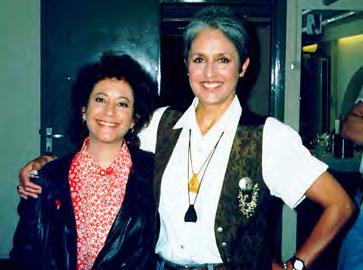
by Jim Piechota
As the winter months churn onward, this time of year still leaves plenty of moments for books and the pleasures of reading before spring brings all of us back outside.
Here are a handful of new queer and queer-adjacent titles from the Sci-Fi/Fantasy realm of fiction for those of you who like a bit of thrilling otherworldliness in your reading material. Enjoy!
“The Storyteller from Balincia” by S.W. Kent
$36.99 (Belquis & Martel)
This inaugural book in the author’s Driftstone Series chronicles the adopted nephew of two female witches, Edi and Pan, who have, over time, become twin rulers of Balincia, a magical otherworldly realm.
Birk is the title character who narrates this sparkling gem of a tale and his placid life takes an adventurous spin upon being gifted a journal by a stranger. Curious to know if there really could be life beyond the mountains which encircle Balincia, Birk embarks on a journey of discovery that opens his mind to new lands, extraordinary mystical creatures, and peculiar but reliable allies (like the hunky Grey) who promise to fulfill a prophecy about defending Balincia after the world is plunged in grave danger.
This is a hefty first installment and definitely a book requiring a time investment, but for fantasy fans, this is well worth it as Kent introduces an enormous, magical cast while immersing the reader into a time and place like none other. Don’t miss this one.
www.swkentbooks.com
“Two Truths and a Lie” by Cory O’Brien, $28 (Pantheon)
In the near future, according to O’Brien’s fantastic new sci-fi novel, the country has become war-torn and climate change has ravaged the landscape, plunging cities like Los Angeles halfway into the bloated Pacific Ocean. Enter Orr Vue, a queer war veteran and fact checker for InfoDrip corporation who has a penchant for drone technology, and who has since gleefully retired into obscurity and serenity.
Shattering that placid lifestyle is the LAPD, who come knocking to inquire about the murder of Thomas Mahoney, his employer, and to ques-
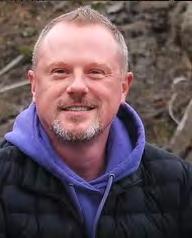

tion him about his knowledge of the suspect they’ve apprehended for questioning: Auggie Wolf, a fellow war veteran soldier and former lover. Orr jumps on the case desperate to free Auggie from the police suspects list.
What follows is a flurry of military surveillance drones, beautiful women, conflicting allegiances, outrageous action scenes, and expository prose that is zany, hyper-descriptive, and so over-the-top, yet fittingly appropriate for the tone and texture of such a wild ride as this novel becomes. Jump in and enjoy this classically zany Cory O’Brien book. www.coryob.com
“Realistic Fiction” by Anton Solomonik, $19.95 (Little Puss Press) April
This vibrant story collection from debut author Solomonik probes the heft and circumstance of trans identity within the scope of a bevy of unique characters and scenarios.
The title tale features a college graduate whose intense dislike of the “slice-of-life type writing” he studied in school is matched only by his affinity for detective novels, which he realizes while on a hot date with a woman, his first encounter since transitioning.
Other winners include the trans sex and politics-forward characters populating the lengthier story, “How to Run for Local Office While Building a Community Out of Nothing,” who just want to have sex and keep democracy intact.
The male protagonist of “The Most



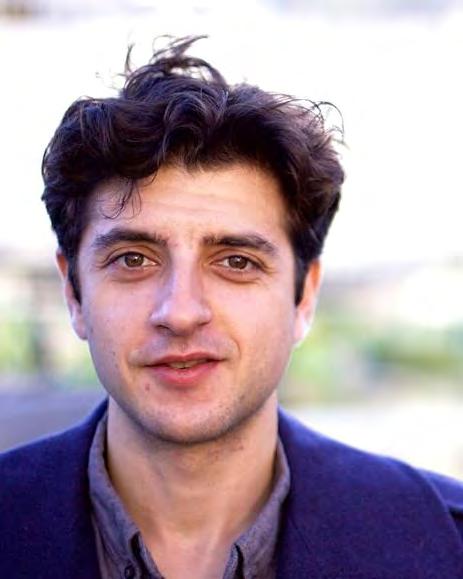
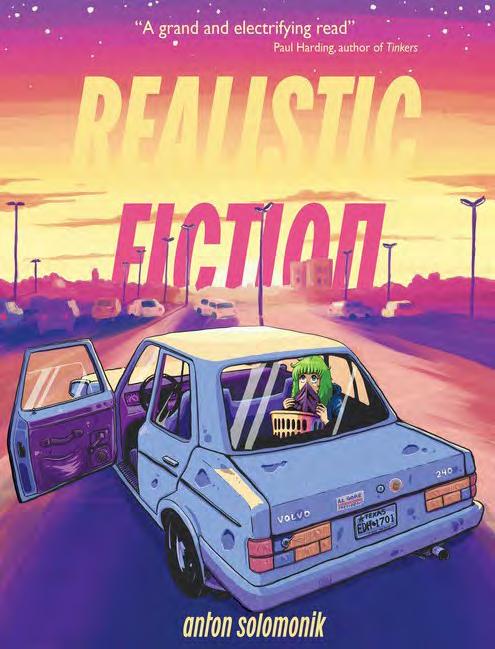
Dangerous Game” dictates how the collectible card game Magic, The Gathering has buoyed him and his social life throughout grade school, high school, college, and beyond.
Witty, insightful, and lots of fun, these eleven stories probe the vitality and vibrancy of the trans community, whose struggle has become magnified in intensity as it seems constantly caught in the crosshairs of government and political detractors.
www.aaanton.com
“Hungerstone” by Kat Dunn, $28 (Zando)
In Dunn’s dark, gothic, and simply brilliant feminist retelling of the 1872 Sheridan Le Fanu novella story “Carmilla” (which inspired the creation of the Dracula saga), an aristocrat named
Lenore Crowther experiences a sexual awakening at the hands of a female vampire.
When Lenore and her magnate husband Henry discover the distraught and injured Carmilla Kernstein on the roadside one day, they take her back to their mansion to recuperate from the apparent accident she’d been involved in.
Carmilla, it turns out, is a vampire and Lenore soon becomes her prey, and once Lenore is bitten, she embraces her newfound independence and freedom to do as she pleases, and she does, but at Henry’s expense. This riveting, blood-soaked fantasy reimagining will be welcomed on the night tables of readers who saw “Nosferatu” on the big screen more than once. www.katalicedunn.comt
